#cook:おつまみ:えだまめ
Explore tagged Tumblr posts
Photo

✿ 枝豆の油揚げピザ ✍️ 油揚げ×マヨネーズ×チーズ→トリプル脂質。美味しい😋
#cook:油揚げ#cook:ピザ#cook:明太子#cook:マヨネーズ#cook:しらす#cook:マヨネーズ×明太子#cook:ピザ用チーズ#cook:おつまみ#cook:2020〜#cook#2020〜#cook:油揚げ×チーズ×マヨネーズ#cook:えだまめ#cook:おつまみ:えだまめ
2 notes
·
View notes
Text

こふく:通称こふ、こふちゃん、稀にこふたん、こふたろう、こふくさん、別名脅威の黒猫
2022年7月、約2ヶ月半で保護施設から引き取られた。脱肛しており長くないかもと言われていたが、無事改善しすくすく育つ。
Jさんに日々挑みかかる強気な幼少期を送るも実は怖がりで、たまのお客さんはおろかじいちゃんにすら挨拶したことがない内弁慶。
だっこを嫌い、呼べば逃げ、最近は何を考えているか分からない顔で床に落ちており、家主ですら意思疎通は困難。しかし朝家主が目覚めると枕シェアによる寄り添いサービスを行っており、一定の愛情はあるもよう。
米をこよなく愛し、炊きたてご飯や準備中の餅米をむしゃむしゃと食べる。また物理的に我が道を行くため多くの物を壊し、実はかなり家主に散財させている。
Kofuku: known as Kofu, Kofu-chan, rarely Kofutan, Kofutaro,or Kofuku-san, and the alias is the black menace
He was adopted from the animal shelter when he was around 2months and a half. Although it was said he might not live so long because he had the anal prolapse, now he has no problems and has gotten so big.
He had a violent childhood attacking Mr.J every day, but his nature is only a home tiger so he can't greet with not only her guests but grandpa yet.
He hates being hugged, runs away when she calls him, and falls on the floor with the face that doesn't know what he's thinking these days, so it's still impossible for landlady to communicate with him. She can feel his affection only by his staying beside service with sharing her pillow when she wakes up.
He loves rice SO much and eats cooked rice or prepared mochi rice. And he always goes his way physically,then broke a lot of things at home so he let her spend quite an extra money...
5K notes
·
View notes
Text
YouTube Channels for Kids by JLPT Levels
(。•̀ᴗ-)✧ resources
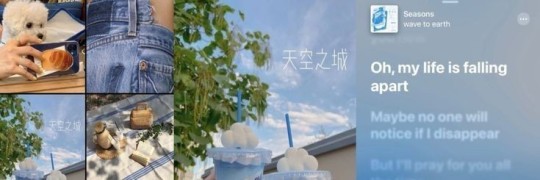
こんにちは, Japanese learners! Learning a language is an exciting adventure, isn't it? To add a spark of joy to your Japanese learning journey, here's a collection of YouTube channels tailored for kids. Organized by JLPT levels, these channels offer a blend of education and entertainment for learners at different stages. Keep in mind, though, that JLPT levels aren't an exact science like math – language learning can be subjective in terms of difficulty. However, these resources provide a fantastic starting point and a fun way to explore the world of Japanese language and culture. Let's hop into this delightful world of animated learning and playful discoveries!
Friendly reminder to adjust your way of learning in order to make the most of what you're studying to reach the goal you truly want! read my post about it (ᵔ◡ᵔ)
꒰ა ˚₊ ✧・┈・╴N 5 ╴・┈・𐑺 ‧₊˚໒꒱
— Curious George (N5 level)
— Japanese folk tales/anime series (Japanese audio/Japanese subtitles) from BomBom Academy (N5 level)
— Peppa Pig (N5-4 level)
— Anpanman (N5-4 level)
— NHK education (N5-4 level)
꒰ა ˚₊ ✧・┈・╴N4 ╴・┈・𐑺 ‧₊˚໒꒱
— Cinnamon Roll, Sanrio (N4 level)
— [Anime] Atashin'chi (N4-3 level)
꒰ა ˚₊ ✧・┈・╴N3 ╴・┈・𐑺 ‧₊˚໒꒱
— Sesame Street Japan (N3 level)
— Chibi Maruko Chan (N3-2 level)
꒰ა ˚₊ ✧・┈・╴N2 ╴・┈・𐑺 ‧₊˚໒꒱
— Precure (N2 level)
またね~@inkichan
꒰ა ˚₊ ✧・┈・╴﹕꒰ ᐢ。- ༝ -。ᐢ ꒱﹕╴・┈・𐑺 ‧₊˚໒꒱
#japanese#nihongo#studyblr#learn Japanese#learning Japanese#japanese langblr#langblog#japanese studyblr#日本語#study japanese#japanese resources#free resources#resources#japanese free resources#youtube#JLPT#JLPT N5
771 notes
·
View notes
Text
食材の多い料理店
The Restaurant of Many Ingredients (Much Meat)
全身白髪だらけだと
As he strokes his red crest,
赤いとさかを撫でながら
Fry Kitchen grumbles that he's covered
フライ・キッチンがぼやく
Head to toe in white hairs
石臼での粉挽きなど
This is the first time in his life
生まれて初めて 昔は
That he's ever ground flour with a stone mortar
そんな身分じゃなかった
This hadn't been his standing in life in the past
.
屍用人に身を落としても
Though he'd stooped to the position of undead servant
家畜の姿に変わっても
Though his form had changed to that of livestock
意外と気分は悪くない
It actually isn't all that bad
今になって気がついたのさ
It was now that he realized
机に積まれた札束など
That stacks of money piled up on a desk
何の意味も無かったんだと
Don't really mean anything
.
肉の焦げた匂いが漂う
The smell of charred meat wafts through the air
次は自分じゃない事を祈る
He prays that he isn't next
.
ずっとうんざりしてたのさ
He'd always been so bored and fed up
23人の兄弟ども
So he finally bid farewell
ようやく別れを告げて
To his 23 siblings
ポーク・チョップは独立した
Pork Chop had set out on his own
嬉しい事のはずなのに
This should have been a happy thing
何故だか少し寂しい
But somehow it was a little lonesome
.
鼻を鳴らして野菜を切る
He cuts vegetables while snuffling and snorting
刃物の扱いは慣れたものさ
He's gotten used to holding a knife
何人も刻んできたから
Since he's chopped up countless people
希代の始末屋だったのに
He'd once been uncommonly stingy
今じゃのろまの従兄弟にさえも
But nowadays he can't even hold a candle
頭があがりゃしないのさ
To those blockhead cousins of his
.
熊の瞳がこっちを見ている
The bear's eyes are looking his way
獲物が自分じゃない事を祈る
He prays that he's not its prey
.
憧れのあの方にならば
Chateau Briand had declared that
食べられても構いませんわ
As long as it was by the one he admired
シャトー・ブリアンは言い切った
He wouldn't mind being eaten
あの日話しかけられなくて
He hadn't been able to speak to them that day
助ける事が出来なかった
And so couldn't save them
後悔は今も残る
His regrets linger even now
.
16人目のコックになる
He'd become the 16th cook
決意して門をたたいたけど
Though he had mustered his will and applied for an apprenticeship
既に屋敷はもぬけの殻
The mansion was already an empty husk
今ではもうあの時とは
And now everything
全てが変わってしまったけど
Is different from the way things were then
変わらないものだってあるの
Yet there are some things that haven't changed
.
けだるげな赤猫をみかける
He spies a listless looking red cat
自分のお腹の肉をなでる
It pats the meat of his belly
.
たどたどしい手つきの料理
I wordlessly gaze upon
行う弟子たちの姿を
The sight of my pupils
俺は無言で眺める
Carrying out their clumsy cooking technique
昔のことなど忘れた
I've forgotten most of my past
それでもこの調理場には
Even so, this kitchen
懐かしい匂いがする
Has a scent that brings back memories
.
誰かと旅をし料理をする
To go traveling with someone, and make food with them,
それがかつて自分が望んだ
Wasn't that the life that I had once
生活だったのだろうか
Wished to have?
店をにぎわす異界の客
These guests from the parallel world bustling through the restaurant,
彼らのために用意された
I reach for the new ingredient
新たな食材を手に取る
That I've prepared for them
.
幸せの花は赤く綺麗で
The flower of happiness is a lovely red
メインディッシュのスパイスに最適
It'll be a perfect spice for the main dish
.
再び弟子たちに目をやる
Again he looks towards his apprentices
選ばなければならない
He'll have to select
メインディッシュの食材を
The main ingredient for the main dish
不足で困る事は無い
He isn't lacking in choice
ここはとても食材の多い
This is Mister Dog's restaurant
ミスター・ドッグの料理店
Of many ingredients
29 notes
·
View notes
Text
Fun fact: The name of every main character in grand maison Tokyo contains the name of a type of food or seasoning.
尾花夏樹 (おばな なつき)
ばなな:banana
早見倫子(はやみ りんこ)
みりん: mirin
平古祥��(ひらこ しょうへい)
こしょう: pepper
芹田公一(せりた こういち)
せり: celery
たこ: octopus
蛯名美優(えびな みゆう)
えび: prawn
松井萌繪(まつい もえ)
いも: potato
峰岸剛志(みねぎし つよし)
ねぎ: scallion
柿谷光(かきたに ひかる)
かき: persimmon/oyster
丹後学(たんご まなぶ)
ご ま: sesame
リンダ・真理子・リシャール (りんだ・まちこ・りしゃーる)
ちこり: chicory
久住琹奈(くずみ かんな)
みかん: orange
江藤不三男(えとう ふみお)
とうふ: tofu
相沢瓶人(あいざわ かめひと)
わかめ: seaweed
京野陸太郎(きょうの りくたろう)
のり: another type of seaweed, dried and edible, often used for wrapping sushi
Some of these are quite obvious like 芹田, 蛯名, and 柿谷 which already have food-related kanjis in them. And some of them are kinda reflective of these characters’ personalities. Banana in natsuki’s name is so cute, yellow one the outside and white on the inside. Mirin, the quintessential Japanese seasoning is symbolic of rinko’s cooking style, incorporating traditional Japanese ingredients into French cuisine. It’s no coincidence that both names of aizawa and kyono, who used to work with obana back in Paris, contain a type of seaweed. The versatility of wakame is representative of aizawa’s talent for paring ingredients. Nori, on the other hand, is very dry like kyono, difficult to eat it alone. Kyono is like nori in that he always needs partners.
#takuya kimura#木村拓哉#La grande maison Tokyo#グランメゾン東京#kyoka suzuki#鈴木京香#it just makes me wondering if the screenwriter came up with the food names first and then characters names or the other way around#editing this post was very exhausting as I had to switch between keyboards and I had around a dozen of keyboards on my phone😵
28 notes
·
View notes
Quote
日本語では一つの名前で表されるのに英語だと二種類以上あるもの
[B! 増田] 日本語では一つの名前で表されるのに英語だと二種類以上あるもの
たとえばつぎのようなもの、というお題。
亀 - Turtle (海亀)、tortoise (陸亀) ワニ - Alligator, Crocodile
- - - - - - - - - - - - - - - -
はてなブックマークがトリビアの披露大会になっていて、知識が集まってる。 逆パターンも 「英語では一つの名前で表されるのに日本語だと二種類以上あるもの」
- - - - - - - - - - - - - - - -
日本語では一つの名前で表されるのに英語だと二種類以上あるもの
聞く:hear, listen 見る:see, look, watch 海:sea, ocean, waters, marine(海の) 仮説:hypothesis, assumption 罪:crime, sin (「罪と罰」の罪は以外なことにcrimeのほう *)
英語では一つの名前で表されるのに日本語だと二種類以上あるもの
Museum:美術館、博物館 Requirement:要件、要求 Space:空間、宇宙
- - - - - - - - - - - - - - - -
「総称だけ存在して、細かな違いを呼び分けない」ものと、「総称は無いが、個々の細かな呼び分けだけある」ものに分けられるかも。 総称:亀 / 個々に:Turtle (海亀)、tortoise (陸亀) 総称:皿 / 個々に:dish、plate、saucer 総称:brother / 個々に:兄、弟
- - - - - - - - - - - - - - - -
秋のAutumnとFallのパターンは、意味もニュアンスも同じで、言い方が違うだけかな。 Fallが「秋」「落下」の2つの意味。
- - - - - - - - - - - - - - - -
仕事(taskとworkとjob)
槍:スピア、ランス、ジャベリン、トライデント。/悪魔:デビル、デーモン
managementもadministrationも(場合によってはcontrolも)「管理」、featureもfunctionalityも「機能」
一番有名なのはネズミ(mouse, rat)だと思ってた。他にもphantom/ghost、coast/beach、house/home、college/university、space/universe、earth/globeとか。厳密には意味が違うんだろうけど。
カラスのravenとcrow。
好き(loveとlike)/時計(clockとwatch)/サイン(sign、signatureとautograph)
言語とその話者の世界観が相関することは言語的相対論と呼ばれる。国がcountry, nation, stateに分かれるのは島国と多民族大陸国との違い。https://gijodai.jp/library/file/kiyo2011/yoshitaka_sato.pdf
ApeとMonkey
AlligatorとCrocodileの違いは、口を閉じたときに下の歯が見えるかだって伊豆で習った。
ちょっと違うが、"将来に対する希望"と、"睡眠中の幻覚体験"を日本語でも英語でも「夢 dream」という��語で表現するのは全くもってピンと来ない。
麦は日本語でも大麦・小麦・ライ麦・エン麦は区別はしてるけど、英語ではbarley wheat rye oatで「麦」に対応する単語がないのよね
アプリ開発で Apple の審査担当とやり取りする際「修正」の言い方が複数あって fix, correct, modify, revise, alter などを使い分けてくるので毎回意図を汲みとれてるか不安になる。(まあ日本語にも修正の類語いっぱいあるけど)
「毒」 poison / venom / toxin
romanceとnovel。romanceは通常騎士道物語など物語と訳されるのだけど、小説と訳されているときもある。
CollegeとUniversity
試験: 学力・知識を問う→examination,quiz,test 評価や実験→experiment 試みる→trial▼ただ「試験」で纏められるだけで日本語でも「考査」「実験」「試行」と分けて書くこともできるが。
自由(Liberty,Freedom)。契約などの法律上のやり取りが単語を増やした気もする。
紫→purple,violet
夫、旦那、亭主、主人→husband
足の指(toe)もfinger じゃない
日本語において、髭は全て「髭」で、生えてる箇所を限定する場合は「顎髭」や「頬髭」などと熟語で表現するが、英語ではそれぞれの箇所に単語がある。
リス:squirrel、chipmunk
馬車がとてもややこしくて面倒くさい / 辻馬車 cab, hansom 荷馬車 (horse)cart, wagon, (horse-drawn)carriage, horse and buggy 駅馬車 stagecoach 二輪馬車 curricle, tilbury ,jaunting car ,jinker 馬二輪戦車 chariot まだまだいっぱい…
今話題のsexとgender
政治家 politician / statesman たまご egg / spawn / roe ちなみに逆もあってegg 卵 / 玉子
この手の単語なら調理法が多い。アメリカは焼く文化だ。肉、パン、物で違う(Grill、Bread、Burn、BBQなんてのも)一方で日本は煮る文化だ。煮る、茹でる、炊く、煮込む。英語はBoil、あるいは残り全てはCookだ。
おじさんとおばさん、日本語でもこだわりがある場合には年上か年下で漢字が違うらしい。中国語では母方と父方で別の名前になる。
- - - - - - - - - - - - - - - -
知里真志保によれば、大和民族が川の始まりと考える「みなもと(源)」をアイヌ語では「川の終り」と言うのだという。つまりアイヌは川を海の方から見ているのだと。
コメントで日本語は部位に依らず「髭」だけってあるけど、いちおう漢字だと「髭(くちひげ)」と「鬚(あごひげ)」と「髯(ほおひげ)」で使い分けられる。発音はぜんぶ「ヒゲ」だけど……
- - - - - - - - - - - - - - - -
言語学で言うところの有標と無標も関係してそう。 作家:男女問わず作家の全般、女流作家:作家の中で女性の場合
標識 (言語学) - Wikipedia
英語のlionは雄雌どちらのライオンも表すが、lionessは雌だけである。前者が無標で後者が有標である。
133 notes
·
View notes
Text
2024/7/28

7月28日 昨日は体の熱が引かなくて、エアコンを23℃まで下げてしまった。夜中にOS1を飲んだ。 今日は2件予定があり、まず午前中の予定のために御徒町から蔵前を歩いた。 少し歩くと町内会の管轄が変わり、変わるたびにラジオ体操の開催案内が掲示されている。それぞれ開催場所の公演と期間が異なっていたので、うまく町内会を梯子すれば夏休み中ずっとラジオ体操ができそう。 私の実家の町は、夏休みの終わりの1週間だけだった気がする。終わりの日にはお菓子の詰め合わせをもらえた気がする。

蔵前は歩く度に違うお店を見つけられて楽しい。 今日はスパイスとチャイのお店を見つけた。 2月にちーちゃんと節分の豆を見た神社へ行くと、神社の事務所の扉が少し開いていて猫が出てきた。
神社の猫、って感じの、少し太々しい表情の猫だった。

1時間くらい街を歩いて、今日も暑すぎるせいか人が少ないことに気がつく。 それか、みんなオリンピックを見ているのかな?と、今日も、また?もう?オリンピックの年なの?!の気持ちでいっぱい。 (都庁へ行く度に、ずっとTokyo2020をやっているのを目にしているからかもしれない。)

神戸の友人から須磨の回転レストランに行った報告をもらう。 写真付きでとてもレトロな感じだった。 ポートタワーの回転レストランも復活したとのことで、久しぶりに関西へ行きたい気持ちになった。 でもうっかり発売開始時刻を逃してしまい、フジファブリックの大阪城ホールのチケットを取り損ねてしまった。

日々着々と入院のためにamazonで注文したものたちが届いている。 入院リストのもの、これで残すは入院中に読もうとリストに入れた坂口恭平の“cook”と三越にまつわる短編オムニバス小説の2冊。 でもじっくり本なんて読んで過ごせる自信はなく、チャート式とか2週間で完ペキ数学Ⅱ・B、みたいな問題集を用意した方がいい気がしている。

5 notes
·
View notes
Text
ガーリックポテト*Garlic Potatos

初めて作るガーリックポテト。定番のヨーロッパ田舎料理です。
ざく切りの玉ねぎをレンジで加熱(箸がすんなり通る位)それをフードプロセッサーでペースト状にします。深めのフライパンに多めのオリーブオイルを入れ、潰したニンニク、パンチェッタを常温から弱火でゆっくり火を通します。ニンニクの風味とパンチェッタの塩気、旨味が油に馴染んだら、パンチェッタを取り出します。その油でパプリカをさっと炒め、取り出します。ニンニクだけを残したオリーブオイルに玉ねぎペーストを加えて弱火で加熱します。注意点は最初は水分が多いので焦げませんが、水分が減り飴色に近づくと焦げやすくなるので、鍋肌からずっと一定に飴色になるまで混ぜ続けましょう。
ニンジンもレンジで加熱しておきます。ジャガイモは好みで皮つき、皮無しどちらでもOKです。こちらもレンジで加熱しておきましょう。
飴色になった玉ねぎペーストに、ターメリックを加えます。そして、ニンジン、マッシュルーム、サラダ豆を加えます。スパイスはナツメグ、コリアンダーを加えます。ニンジンの角がとれるぐらいに炒めたら、白ワインを全体が浸るぐらい加えて火を強め蓋をします。
アルコールが飛んで玉ねぎペーストが全体に絡んだら、ジャガイモ、パンチェッタをフライパンに戻します。そして最後にパプリカを加えます。
ここで大切なことは、ジャガイモのホクホクした食感、パンチェッタの歯ごたえ、パプリカのシャキッとした食感を残すことです。
全体の色目、風味を確かめてターメリックを足しても良いでしょう。
そして最後に粉チーズで塩加減を調整し、クローブ、粗挽きコショー、そしてパセリを多めに加えます。好みでオレガノ、バジル、パプリカパウダー等を加えてもいいでしょう。
これで完成です。
常備菜として作り置きして、グラタン皿に盛りチーズを加えオーブントースターで温めたり、オムレツの中身として具材に使ったり、食べる毎にバリエーションが楽しめます。
パートナーから��[一生食べ続けられるほど美味しい]と称賛されました。
First time making garlic potatoes. A classic European country dish.
Heat roughly chopped onions in the microwave (to the point where chopsticks can easily pass through them), then use a food processor to make a paste. Put a large amount of olive oil in a deep frying pan, and slowly cook the crushed garlic and pancetta over low heat from room temperature. Once the garlic flavor and the salty, umami flavor of the pancetta have blended into the oil, remove the pancetta. Lightly fry the paprika in the oil and remove. Add the onion paste to the olive oil, leaving only the garlic, and heat over low heat.The thing to keep in mind is that it won't burn at first because it has a lot of moisture, but as the moisture decreases and it approaches a candy color, it will burn easily, so keep stirring until the skin of the pot becomes a candy color.
Heat the carrots in the microwave as well. You can use potatoes with or without skin, depending on your preference. Let's heat this up in the microwave too.
Add turmeric to the caramelized onion paste. Then add carrots, mushrooms and salad beans. Add nutmeg and coriander to the spices. Stir-fry the carrots until the corners come off, then add white wine until they are completely submerged, turn up the heat, and cover.
Once the alcohol has evaporated and the onion paste is fully coated, return the potatoes and pancetta to the frying pan. And finally add paprika.
You may want to check the overall color and flavor and add turmeric.
Finally, adjust the salt level with grated cheese, and add cloves, coarsely ground pepper, and plenty of parsley. You can also add oregano, basil, paprika powder, etc. if you like.
This completes the process.
You can make it as a regular dish, add cheese to a gratin dish and warm it up in the toaster oven, or use it as an ingredient in an omelet, or enjoy a variety each time you eat it.
My partner praised it, saying it was so delicious that I could keep eating it for the rest of my life.
材料
玉ねぎ 大2個 ジャガイモ 大4個 ニンジン 大1個 マッシュルーム 大5、6個 パプリカ 3、4個 ニンニク 5、6片
パンチェッタ
オリーブオイル 白ワイン 粉チーズ ターメリック ナツメグ コリアンダー
クローブ 粗挽きコショー
パセリ、オレガノ、バジル、パプリカパウダー等。
Ingredients
pen2 large onions
4 large potatoes
1 large carrot
5 or 6 large mushrooms
3 or 4 paprika
5-6 cloves of garlic
Panchetta
olive oil
white wine
powdered cheese
turmeric
nutmeg
coriander
cloves
coarsely ground pepper
Parsley, oregano, basil, paprika powder, etc.
2 notes
·
View notes
Text
BNHA 387 Japanese to English Translation + Commentary

火叢は血が濃いんだ ひむらはちがこいんだ
= “Himura blood is thick.”
Tagline 1:
No.387 煮凝り
ナンバー387 にこごり
= No. 387 Nikogori
煮凝り (romaji: nikogori) is a traditional Japanese jellied broth made by boiling meat or fish bones, scales, heads, and tails to extract a savory nutrient-dense jelly that is then cooled and solidifies due to its high gelatin content. Other gelatins are sometimes added to the mix. After cooling and solidifying, the nikogori jelly is typically used to encase or accent other foods. Unagi nikogori, pictured below, is a dish of eel encased in fish gelatin, for example:
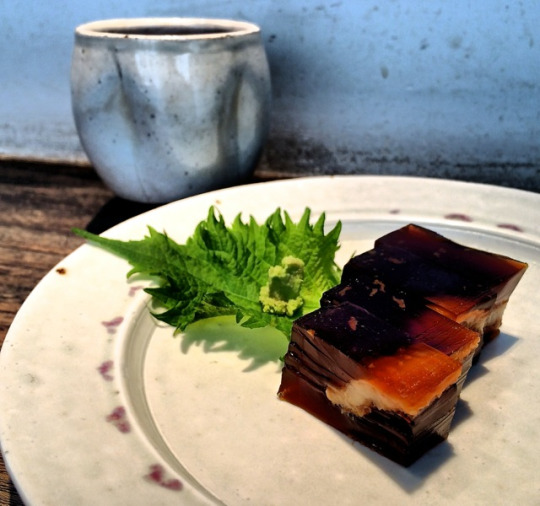
Nikogori is written using two kanji: 煮 (= “burn; boil; cook”) and 凝 (= “freeze; congeal”). In No.351, Touya mocks Shouto by comparing him to the jellied broth, making a pun of the kanji for nikogori and the kanji for Shouto’s name, both of which translate to “burn” + “freeze.” But Shouto doesn’t appear in this chapter, so who, if not him, does the title, Nikogori, refer to? Touya, the other fire + ice broth-er.
Tagline 2:
語るは…
かたるは…
= The speaker…
古くからの庄屋だった火叢は農地改革後も分家を増やす事で財とプライドをなんとか保ってきた ふるくからのしょうやだったひむらはのうちかいかくごもぶんけをふやすことでざいとプライドをなんとかたもってきた
= “The Himuras, who were village leaders in times of old, managed to preserve their fortune and pride even after [Japanese] agrarian reform by adding branch families.”
Here’s a very, very brief excerpt from a published journal article about the subject:

Japanese agrarian reform “gave land to the landless.” This monumental redistribution of land and associated resources came at a great cost to village heads, called “landlords” by the author, whose power and influence decreased significantly in the years that followed. The Himuras tackled the problems of ongoing land and monetary losses by increasing their numbers through the establishment of branch families (i.e., more members = more opportunities to accumulate wealth for the family and maintain some semblance of their former status).
Tagline 3:
超常解放戦線幹部
ちょうじょうかいほうせんせんかんぶ
= Paranormal Liberation Front Officer
Tagline 4:
外典 個性「氷操」
げてん こせい「ひょうそう」
= Geten, Quirk: “Ice Manipulation”
でも超常が起きると共に加速度的に零落していった でもちょうじょうがおきるとともにかそくどてきにれいらくしていった
= “Nevertheless, the advent of the paranormal hastened their ruin.”
血が混ざるのを嫌ったんだ ちがまざるのをきらったんだ
= “They hated mixing blood.”
お家柄と…異形差別のコンボね スピナーが聞いたらなんて言うかな おいえがらと…いぎょうさべつのコンボね スピナーがきいたらなんていうかな
= “A combination of pedigree and… igyou* discrimination. What would Spinner say if he heard this?”
異形 (romaji: igyou) is the word commonly translated as “heteromorph,” and indeed, it can mean “atypical appearance; atypicality; heteromorphy.” There are two potential hiragana forms for 異形. The first, いぎょう, corresponds to the dictionary meaning “fantastic; grotesque; strange-looking; suspicious-looking” and is the word used by everyone in-series to refer to this class of people.

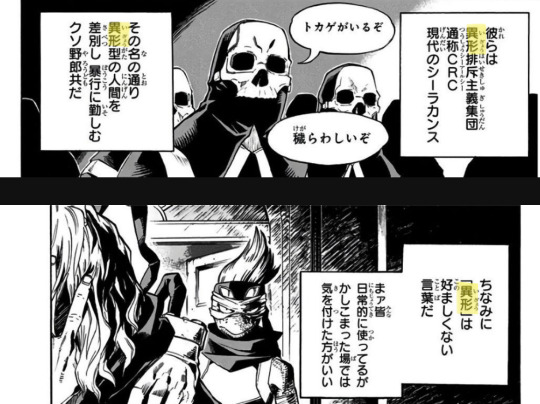


The second, いけい, corresponds to the dictionary meaning “atypical appearance; atypicality; heteromorphy.” Characters like Spinner and Shouji belong to a class of people literally called “grotesque [people].” Caleb’s choice to translate igyou as “heteromorph” understates the violence and prejudice built into the word itself. Functionally, igyou is a racial slur that stereotypes an entire subpopulation as socially undesirable, untrustworthy, and criminal, even monstrous. But if we are to believe that Mr. Compress cares about Spinner as his friend, why does he use it? Because, as Spinner notes in No.220, no one can agree on an alternative word that isn’t offensive.
Tagline 5:
Mr.コンプレス ミスターコンプレス
= Mr. Compress
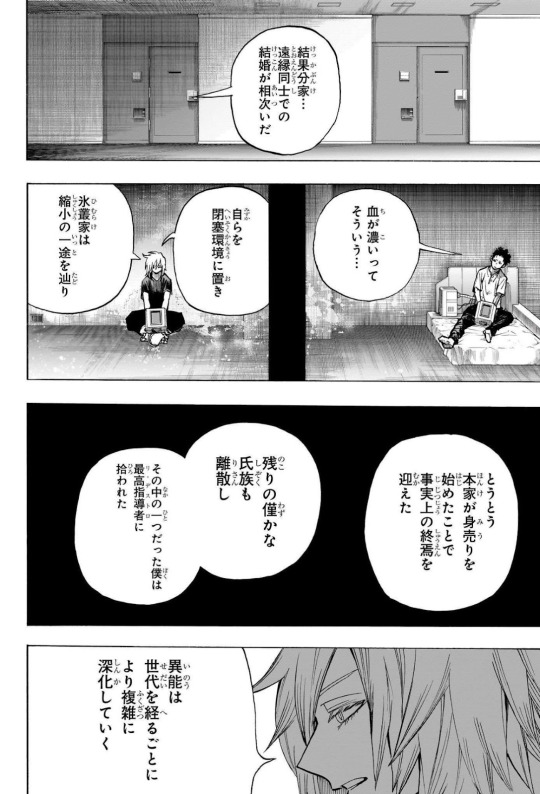
結果分家…遠縁同士での結婚が相次いだ けっかぶんけ…とおえんどうしでのけっこんがあいついだ
= “As a consequence of [these] branch families… marriages among distant relatives occurred one after another.”
血が濃いってそういう… ちがこいってそういう…
= “That’s what you meant by thick blood…”
自らを閉塞環境に置き火叢家は縮小の一途を辿り みずからをへいそくかんきょうにおきひむらけはしゅくしょうのいっとをたどり
= “By placing themselves in a closed [genetic] environment, the Himura family continued to shrink,”
とうとう本家が身売りを始めたことで事実上の終焉を迎えた とうとうほんけがみうりをはじめたことでじじつじょうのしゅうえんをむかえた
= “and when eventually the main family began to sell themselves [into marriages with members of other prestigious families], it came to a de facto end.”
残りの僅かな氏族も離散し のこりのわずかなしぞくもりさんし
= “The few remaining families are scattered.”
その中の一つだった僕は最高指導者に拾われた そのなかのひとつだったぼくはリ・デストロにひろわれた
= “I was one of them and was picked up / taken in by Re-Destro (read as: the Supreme Leader).”
異能は世代を経るごとにより複雑に深化していく いのうはせだいをへるごとによりふくざつにしんかしていく
= “As meta abilities pass through generations, they deepen in complexity.”
In other words, Quirks have grown more complicated and therefore more difficult to understand and manage with each successive generation. Quirk Singularity is real, BUT NOT EVERYONE EXISTS AT A SINGULARITY. ALL QUIRKS ARE NOT CREATED EQUAL. THE POINT OF QUIRK MARRIAGES WAS TO COMBINE POWERFUL QUIRKS TO EXPEDITE THE SPEED WITH WHICH A PERSON WOULD ACHIEVE A SINGULARITY, TIPPING THE BALANCE OF POWER IN FAVOR OF THOSE WITH THE STRONGEST QUIRKS. EVEN AMONG CLOSE BLOOD RELATIVES, SOME MEMBERS WILL HAVE INHERITED DIFFERENT COMBINATIONS OF GENES PRODUCING DIVERSE RESULTS. IT IS POSSIBLE FOR ONE MEMBER OF A FAMILY TO HAVE REACHED SINGULARITY AND ANOTHER NOT. FUYUMI AND NATSUO ARE NOT SHOUTO, AND SHOUTO IS NOT TOUYA. QUIRK SINGULARITY IS NOT A “GOOD” OR BENEFICIAL THING. AT THAT POINT, A QUIRK BECOMES UNCONTROLLABLE, HIGHLY VOLATILE, AND DANGEROUS TO ITS USER. THE PERSON IS BEING DRAGGED BY THE QUIRK. THEY DO NOT HAVE A QUIRK; A QUIRK HAS THEM.

濃く深く堆積した因子には本人すら知覚し得ない力が眠っているかもしれない こくふかくたいせきしたからだにはほんにんすらちかくしえないちからがねむっているかもしれない
= “In thickly and deeply layered bodies (read as: [Quirk] factors) may lie latent abilities / power even the person themselves is unaware of.”
だが人は心を置き去りにしたままだ だがひとはこころをおきざりにしたままだ
= “But people still just abandon their hearts.”
The word commonly translated as “Quirk” is kosei, meaning “individuality; personality; quirk; idiosyncrasy; character; individual characteristic.” By definition, then, Quirks are more than cool special features some people “have” and some people “don’t have.” They’re an expression of the self, a peek into who a person is, their “heart” or “nature.” The Quirk reflects the person as much as the person reflects the Quirk. To deny one’s Quirk is to deny one’s self. To reject the Quirk is to reject the person. Under this definition, and if we think of Quirks as windows into the soul, so-called “Quirkless” people also have a Quirk: being “Quirkless.” If Quirks are manifestations of a person’s individuality or personality, then Quirkless people would be characterized by a weak or nonexistent sense of self (and subsequently, an underdeveloped sense of self-preservation and exaggerated tendency toward self-sacrifice).
明日…何が変わるだろう あす…なにがかわるだろう
= “Tomorrow… I wonder what [tomorrow] will bring.”
変わる (romaji: kawaru) is a verb meaning “to change; to be transformed; to be altered; to vary (e.g., the weather may be changeable, prone to sudden dramatic shifts).”
Geten assumes the world will be changed by the war and is wondering how it will be different.
さァ次はおまえだ さァつぎはおまえだ
= “Well, next is you.”
警察・ヒーローと何を話してた? けいさつ・ヒーローとなにをはなしてた?
= “What were you talking about with the police and Heroes?”
何でもいい聞かせろこの戦いが終わるまでの暇つぶしに なんでもいいきかせろこのたたかいがおわるまでのひまつぶしに
= “Let me hear anything to kill time until this war comes to an end” or “Anything [you want to tell me] is fine [by me] to kill time until this war comes to an end.”
Geten is anxious about the outcome of the war. He is requesting that Atsuhiro help him fill the silence. Any words will do. All that matters is that he is not left alone with his thoughts.
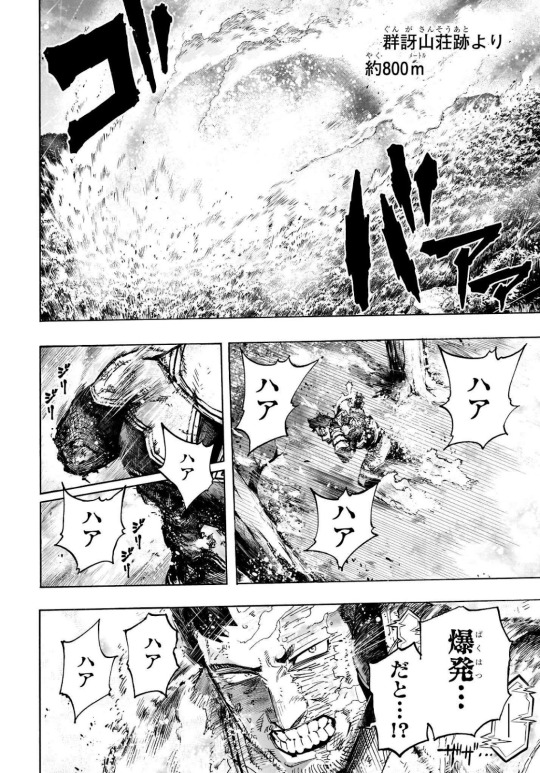
群訝山荘跡より約800m
ぐんがさんそうあとよりやく800メートル
= Approximately 800 [Meters] from the Gunga Mountain Villa Ruins
ハア
Note: This is an onomatopoeia for the sound of heavy panting/breathing. You’ll notice it repeated several times on this panel. Enji is exhausted and struggling.
爆発… だと…⁉︎ ばくはつ… だと…⁉︎
= “Explosion…!?”
This has no real bearing on the translation, but I do want to address it since my translation of this line differs slightly from Pikahlua’s (“An explosion… you say…!?”) and some may wonder why. だと (romaji: dato) is formed by the copula da and the quoting particle to. It expresses surprise or disbelief at something someone has said. Here, Enji is quoting something he has heard (i.e., that any time now Touya will explode, killing them all) and expressing his incredulity at the news. Dato is commonly translated in English as “you say,” but it might also be conveyed simply by the inclusion of an interrobang, that is, the exclamation point + question mark combination at the end of a sentence. Maybe it’s because I write fiction from time to time, but when I am translating, I read the text out loud to hear how it sounds. Sometimes a line sounds better in one language than it does another. To my ears, ��explosion… you say…!?” sounds kind of weird and unnatural. How often do you hear a native English speaker speak like that? And yet, native English speakers express surprise or disbelief at something they’ve heard all the time. So, I opted to let the interrobang do the talking. The meaning of the sentence isn’t affected by whether the translator decides to translate dato directly into written form (i.e., “you say”) or not. Context and interrobang are enough on their own to convey that the speaker is shocked by something they have been told.
ハア
Note: This is an onomatopoeia for the sound of heavy panting/breathing. You’ll notice it repeated several times on this panel. Enji is exhausted and struggling.

避難ブロックだけじゃない… ひなんブロックだけじゃない…
= It won’t just be the evacuation blocks…
今トガの増殖を抑えてるピクシーボブたちもーーー‼︎ いまトガのぞうしょくをおさえてるピクシーボブたちもーーー‼︎
= Pixiebob and the others currently suppressing Toga’s proliferation———!!
いかん…AFO戦のダメージが脚に来ている…! いかん…オール・フォー・ワンせんのダメージがあしにきている…!
= This is bad… The damage from the AFO battle is spreading to my legs…!
Notice how Enji’s body is drawn: with his right side emphasized (toward us), calling attention to his amputated arm and gouged side. If you recall from No.354, Endeavor sustained a nasty injury not unlike the one that ended All Might’s Hero career. It is the reason All Might regularly coughs blood. These critical injuries are definite parallels, with Endeavor’s injury being to his right side and All Might’s to his left. Mirrors. This is not the first time the two rival Heroes have mirrored one another. During his career-defining encounter with the High-End Noumu called Hood, Endeavor raised his right fist to signal his triumph over his opponent, recreating All Might’s iconic victory pose but with the opposite arm. Unlike All Might, however, Enji also lost his right arm in his fight against AFO and was forced to cauterize his wounds closed, potentially further damaging internal structures and tissues, or else bleed to death on the battlefield. Cauterizing an injury might buy a person time getting to a hospital, but it does not solve the problem of significant blood loss due to amputation and/or maiming, nor does it mitigate the risk of infection leading to the development of sepsis and multiple organ failure. I know, I know. BNHA is a work of fiction and fiction is seldom an accurate representation of reality, but it is worth bearing in mind that Toshinori continues to suffer medically due to his years-old injuries. His survival came at a steep cost, a cost paid by the losses of his career, health, and quality of life. Assuming Endeavor survives the war, he will likely have similar issues.
That Endeavor’s lower half is now being affected by AFO’s mutilation of his upper half suggests that more is going on internally than is apparent. It’s worse than it looks.
これ以上燈矢を誘導して遠くへ向かうには———… これいじょうとうやをゆうどうしてとおくへむかうには———…
= [I don’t think I can] lead Touya any farther away———...
あっ
= “AH”
お
= “OH”

おどおさん
= “DAAAD,”
見で みで
= “LOOK.”
見でええ みでええ
= “WAAATCH [ME].”
Let’s talk about how Touya is speaking, because it is indicative of his collapsing mental state. The first thing Touya says is お父さん (romaji: otousan), meaning “father; dad.” This is the most common and most respectful way for Japanese children to address their fathers, but Touya slightly mispronounces it, softening the harder “t” sound into a rounder “d.” Otousan becomes odousan. He also elongates the “o” sound that forms the middle of the word. So, otousan becomes odouusan. In English, Touya is just saying “dad,” but in Japanese, there is a subtle pronunciation difference that deviates from Touya’s norm, clueing us in that something is wrong.
見て (romaji: mite) is the te-form of the verb 見る (romaji: miru), meaning “to see; to look; to watch; to view; to observe.” It can also mean “to look after; to attend to; to take care of; to keep an eye on.” This word and the concept of seeing or watching plays a pivotal role in the Todoroki subplot, particularly in relation to Touya, Enji, and Rei’s characters, with Touya begging to be seen, Enji and Rei admitting to not seeing him, and Endeavor asking the frightened civilians (and Shouto) to watch him. Something I don’t see discussed enough is the nuance of this word. Yes, it means “to see; to look; to watch” and is usually translated as such, but it can also mean “to look after; to attend to; to take care of (e.g., in a medical or caretaking sense, the way a doctor or nurse does a patient or a good parent does a child).” It is a gross oversimplification of Touya’s character to say he is just “throwing the tantrum of a lifetime because Daddy and Mommy didn’t look at him enough / pay him enough attention.” Touya is asking for more than to be acknowledged. He is asking to be taken care of, to be loved and sympathized with and understood and held and protected in exactly the way every child needs and deserves. “SEE ME. CARE FOR ME.” People need people. Children need their parents. I say this as the oldest sibling who did my damndest to “raise” and shield my younger siblings from the chaos and dysfunction of our household: Siblings are not enough, can never be enough, and can never replace the unconditional love and support of a warm, emotionally attuned parent. Neither can friends or found family. Relationships come in many forms. Love comes in many forms. Healing comes in many forms. But at his core, Touya is still that wounded little boy abandoned and forgotten by his father and mother who needed them desperately and cried out for a decade before self-immolating on Sekoto Peak for anyone to help him because his best childhood efforts to help himself weren’t enough to stop his downward spiral. His every bid for connection fell on deaf ears because his father and mother BOTH lacked the emotional maturity, psychological wellness, knowledge, and skills to support him, and his siblings were children themselves, unable to meet his needs or their own.
Regardless of how we might feel about them as parents (if you are familiar with my posts, you know I have LOTS of strong feelings about that), it is important to recognize that Enji and Rei were themselves wounded children who grew up to be wounded adults who were not supported to become the best versions of themselves. Their chances of raising happy, healthy, well-adjusted children without first doing the work to become happy, healthy, well-adjusted individuals were slim to none. Touya is unique in that he is the only Todoroki sibling not shown to form part of a protective pair during his time in the house. Playing with your siblings is not the same thing as being supported by them. When Touya cried, he cried alone without anyone to comfort him. When Touya burned, he burned alone. When Enji was terrorizing Rei or Shouto, Fuyumi and Natsuo held one another while Rei and Shouto moved to defend and console the other. Where was Touya? We don’t know. He was literally not pictured, an artistic choice designed to render him as invisible to us, the reader, as he was to his family. What we can be certain of is that wherever Touya was, he was crying… and burning. Everyone in the family suffered. Touya suffered differently. He is both a product and a reflection of his parents’ personal failures. Enji has attempted to carry the burden of accountability for Touya’s outcome entirely on his shoulders, as if he alone was the “problem” and the “solution,” but there is one other person who shares that responsibility, and it’s not Shouto. It’s Rei, Rei who is Touya’s mother, his other parent. She, too, failed to nurture, protect, and care for her children, and Touya died and became Dabi as a result of her (and Enji’s!) inadequacies. In No.302, Rei said that everyone in the family would have to “take responsibility for what happened and what happens next,” but she was wrong and shifting blame. It is Rei and Enji who must take responsibility, because it is they who were responsible for Touya, not Fuyumi or Natsuo or Shouto. Hopefully, we’re moving toward them actually doing that. Hopefully.
Circling back to the translation, Touya means to say “miTe.” What he actually says is “miDe.” This is someone who chooses his words carefully and speaks with intention, so it is absolutely cause for concern that he is mispronouncing common words.
Before we move on to the next panel, I want to point something out that would be easy to miss if you’re the kind of person who skims the pages without taking the time to reeeeaaaallllyyyy look at the illustrations.
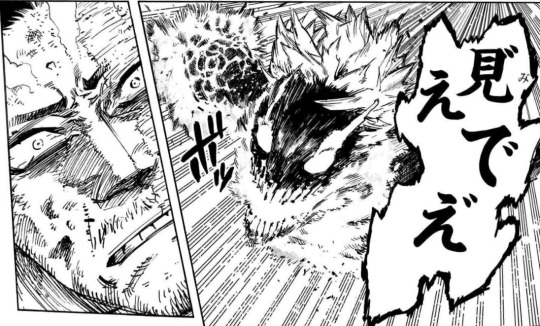
Take a good, long, hard look at Touya’s right arm, the one he’s swinging toward Endeavor. It is literally shattering into pieces as it swings forward. During the post-death cremation process, after which Dabi is named, the body is reduced to its essential elements via exposure to open flame, intense heat (1400-2000°F), and evaporation. The tissues, organs, and fat of the body are destroyed. This is known as primary combustion. During secondary combustion, the inorganic particles that remain after primary combustion, which consist mainly of carbon dioxide and water vapor, discharge, leaving behind bone fragments that are then pulverized into “ashes,” at least in the West. In the East, these pieces of bone are collected and placed in a funerary urn for burial, which may happen immediately or some time after the cremation ceremony (Dabi). Touya is cremating while still alive. Charred pieces of tissue and bone are being thrown from his body with every move. This is not new. This is not something Endeavor, who, for all his running, has yet to attack Touya, did. This is something that was happening from the moment Touya found himself warped to the Kamino Ward with Shouto instead of Endeavor and that Shouto sped along, whether he intended to or not, by repeatedly attacking Touya. If you go back to those chapters, you’ll notice black flecks of burnt skin and other tissues being blasted off of Touya’s body every time Shouto strikes and light peeking through the tiny holes forming in his body. Phosphor was specifically created to protect Shouto (and other Heroes) from Touya’s flames by holding Shouto’s internal temperature steady and neutralizing Touya’s incredible heat, rendering him powerless to defend himself and/or harm others. Every second Touya spent with Shouto pushed him closer to death.
Let’s quickly talk about names and the implications of them. The kanji for Touya’s name are 燈矢, meaning “light; lamp; lantern; candlelight” and “arrow,” respectively. The accompanying hiragana, which tell us how to pronounce the name, are とう (romaji: tou) and や (romaji: ya). These hiragana can also mean “training; education; cultivation,” which is fitting because one of Touya’s defining attributes is his awesome work ethic and commitment to continuous self-improvement. The impression of the name is of something on the climb, soaring high above the clouds, which is also fitting as this is exactly what Enji hoped and believed Touya would do. If you are familiar with the kanji for Shouto’s name, you know they translate to “burn” + “freeze.” Clearly, he was named for his Quirk. For Enji, Touya was person before Quirk, his son; Shouto was Quirk before person, his masterpiece and means to an end. But what of the hiragana for Shouto’s name? These are しょう (romaji: shou), also the hiragana associated with the kanji (= 賞) for “prize; award,” and と (romaji: to). This combination of hiragana bears a striking resemblance to the hiragana for 消灯 / しょうとう (romaji: shoutou), meaning “to put out the light; to turn off the lights.” If Touya = “light,” then Shouto = one who does away with the “light.” As sad as it is and as disturbing as it might be, Shouto’s birth all but guaranteed Touya would die.
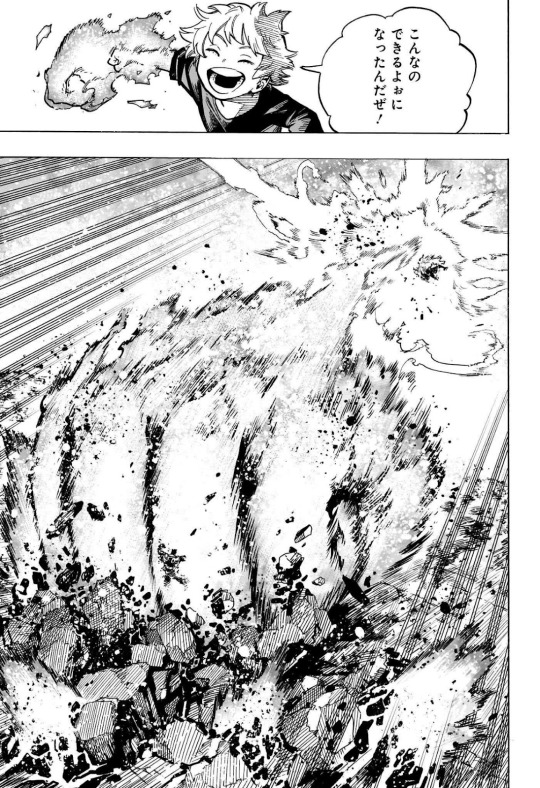
こんなのできるよぉになったんだぜ!
= “I’ve become able to do something like this!” or “I can do this now!”

炎を止めろ燈矢…‼︎ ほのおをとめろとうや…‼︎
= “Stop the flames, Touya…!!”
He can’t, couldn’t if he wanted to. Touya’s Quirk is tied to his emotions. The more panicked he is, the more frenzied his attacks will be. Look how chaotic his movements are. He’s losing his shit.
見でええ みでええ
= “WAAATCH [ME].”
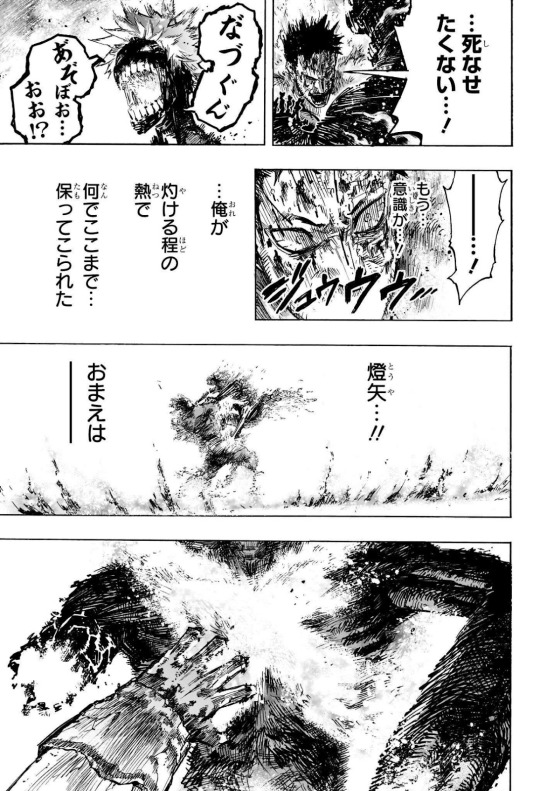
…死なせたくない…! …しなせたくない…!
= “... I don’t want you to die…!”
なづぐん
= “NATSU-KUN,”
This is also mispronounced. He means “Natsu-kun,” but he says “Nadzu-gun.”
あぞぼお…おお⁉︎
= “LET’S PLAYY…YY!?”
もう…意識が…! もう…いしきが…!
= [His] consciousness… is already…!
This is Enji realizing that it’s too late for Touya. Once again Enji kept Touya waiting and missed every opportunity (and there have been many) to reach (and “save”) him, allowing himself to be persuaded to entrust Touya to someone else (= Shouto), just like he did when Touya was a child, because it benefitted everyone else more for Touya to be dead last on the Number One Hero’s list of priorities than first. More than anyone, Touya needed his father. More than anyone, Touya hoped his father would come through for him. More than anyone, Touya believed his father would. And more than anyone, Touya’s father has devastated him and taught him again and again that he does not matter. His pain does not matter. His life does not matter. And his (second) death will not matter (just like his first didn’t).
…俺が灼ける程の熱で …おれがやけるほどのねつで
= … [This] heat is enough to burn [even] me.
The word used here for “heat,” netsu, can also mean “zeal; passion; enthusiasm.”
Let’s put netsu in the context of Touya’s Quirk. Enji said about Touya that he was born with talent and firepower greater than his own. We know from No.301-302 and from No.267 that the strength and intensity of Touya’s flames is influenced by his emotional state. If Enji’s zeal, passion, and enthusiasm [to become superhuman and prove it to himself by surpassing All Might, a “real superhuman”] burned hot enough to blind him to how his family was being impacted, Touya’s burns even hotter. The more desperate Touya becomes, the more destructive his fire will be. His emotions dictate his Quirk, and his Quirk dictates his behavior. Touya does not “possess” a Quirk in the traditional sense, like Uraraka or Kirishima or Mineta do. A Quirk possesses him.
何でここまで…保ってこられた なんでここまで…たもってこられた
= How has he… endured [the heat and not died] up to this point?
燈矢…‼︎ とうや…‼︎
= Touya…!!
おまえは———
= You———
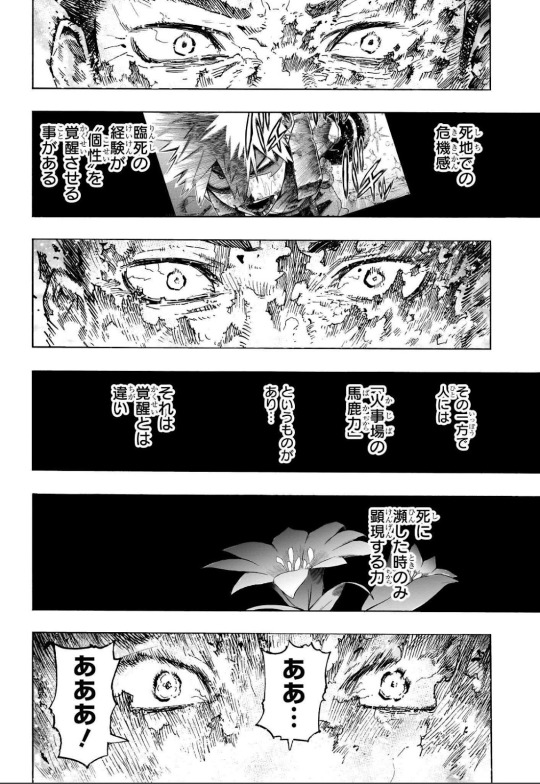
死地での危機感 しちでのききかん
= [A person’s] sense of impending crisis [in the face of] almost certain death.
臨死の経験が"個性"を覚醒させる事がある りんしのけいけんが"こせい"をかくせいさせることがある
= There have been cases of Quirks being awakened by near-death experiences.
その一方で人には「火事場の馬鹿力」というものがあり… そのいっぽうでひとには「かじばのばかちから」というものがあり…
= On the other hand, people [have been known to] have something like ‘hysterical strength at the scene of a fire.’
馬鹿力 (romaji: bakajikara) literally translates to “stupid strength.” Several online dictionaries return these additional definitions: “hysterical strength; animal strength; great physical power.” However it is translated, bakajikara refers to the superhuman strength, speed, agility, and endurance that a person might experience under extreme physiological stress to help carry them through a high stakes event, such as being trapped in a burning building or fighting off an assailant. Recently I read a news article (and watched a video) about a family whose apartment caught on fire with the mother and children inside. Neighbors and passersby called for the mother to jump from the balcony with the small child she was carrying in her arms, but again and again she ran back through the flames to retrieve her other children. After dropping the second child to the safety of the civilians down below, she was on fire and dying, but she braved the flames one more time to save her third and final child. Then she dropped dead on the balcony. Her injuries were so horrific, she could not even be visually identified as a biological female. Had it not been for her children clarifying that they were home alone with their mother when the fire started, the police would not have known who she was. But how did she do it? How did she keep moving long enough to save her children, even as she was burning beyond recognition? Love… and “stupid strength.”
それは覚醒とは違い それはかくせいとはちがい
= That’s different from an awakening.
死に瀕した時のみ顕現する力 しにひんしたときのみけんげんするちから
= [A] power / ability that manifests only when [a person is] on the brink of death.
ああ…
= “Yes…”
あああ!
= “I get it!”

冷の れいの
= Rei’s
"個性"…‼︎ "こせい"…‼︎
= Quirk…!!
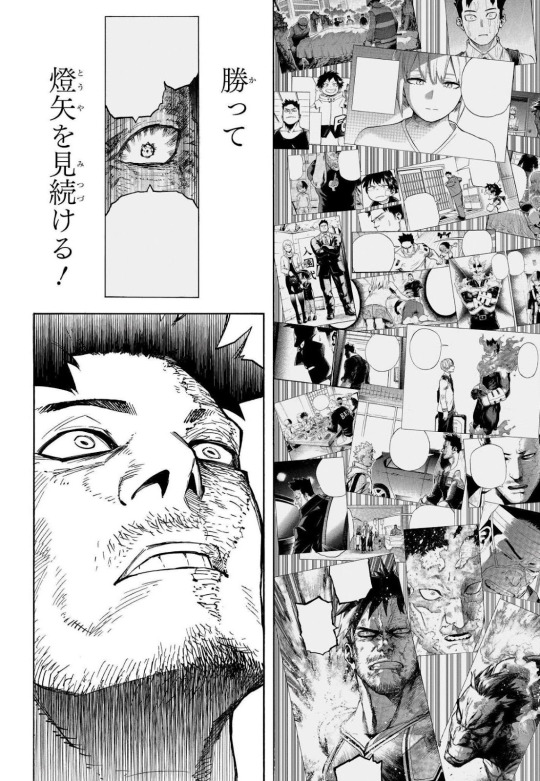
勝って燈矢を見続ける! かってとうやをみつづける!
= [I will] win and keep seeing / watching Touya!
This is a flashback to No.357 when Endeavor set his intention to defeat AFO and continuously see / look after Touya. It sounds to me like he was hoping to win to save and save to win.

全部俺の責任だ ぜんぶおれのせきにんだ
= “This is all my fault.”
全部背負って償いに生きねばと思っていた ぜんぶせおってつぐないにいきねばとおもっていた
= “I thought [that I had] to bear the burden of responsibility for everything and live to make amends.”
でもおまえはずっと俺を見続けてたんだもんな… でもおまえはずっとおれをみつづけてたんだもんな…
= “But all along you kept watching me, even though…”
おまえを見てやれなかった…… おまえをみてやれなかった……
= “I couldn’t see you……” or “I couldn’t look at you……”
It’s not that Enji didn’t know Touya was suffering. It’s that he didn’t want to know it, because the knowledge that his actions had destroyed his son’s mental health was overwhelming and terrifying and made him feel weak and powerless to do anything but play out the same tired routine day after day to make Touya’s—and his late father’s—destruction mean something. That feeling of powerlessness [probably, almost certainly] reminded him of being a kid helpless to save his father and determined to never feel that way again, so he ran. It was easier to bury his head in the sand and pretend not to see the damage he had done to the person who trusted, believed in, loved, and needed him most. I wouldn’t be surprised if Enji’s relationship with Touya prior to his “death” by fire mirrored his relationship with his own father, another flame-user who also tragically perished in a fire. I especially wouldn’t be surprised if that is the case because that dynamic seems to be implied to be generational in No.356.
But Enji isn’t the only one who turned a blind eye to Touya’s despair. Touya was falling apart emotionally and physically, so Rei abandoned him and the others and attached herself to Shouto, Shouto who never held her accountable for her part in the family dysfunction and still showed promise, promise that ensured Enji would continue financially supporting her and the Himuras so they didn’t have to adapt to the modern era that didn’t reward them for no other reason than that they were Himuras by—I don’t know—getting a job like everyone else who can’t get by on a name alone. Fuyumi coped with her traumatic home life by becoming a person who sweeps problems under the rug, pretends they don’t exist, and implicitly shames others (e.g., Natsuo, Shouto) for not doing the same and “letting bygones be bygones.” The Todorokis, namely Enji, Rei, and Fuyumi, collectively chose to avert their eyes and deny, deny, deny. Natsuo isn’t totally blameless either. In No.302, Natsuo, now an adult and student in the mental health field, remarks that he should have “punched [Enji] and confronted Touya,” a loaded, victim-blaming comment that all but confirms he believes Touya (but not Rei?) also was at fault for the family’s problems. This is not at all uncommon in abusive households, but it is problematic in that it attributes blame as much or more to victims than to perpetrators. And yes, I realize that Rei, too, was a victim and yet I am assigning culpability for her children’s adverse childhood experiences both to her and to Enji, the (primary) perpetrator. The difference is that Rei was an adult, while the children were minors incapable of advocating for themselves or seeking help from external sources. They were dependents forced by age, developmental stage, and a lack of financial resources to rely on adults to meet their needs. Ultimately, Rei, not unlike Enji, was an adult with a responsibility to her children that she failed to uphold.
おまえにも償わなきゃいけなかったんだ おまえにもつぐなわなきゃいけなかったんだ
= “I needed to atone to you as well.”
No shit? Why is this being treated like some kind of revelation? Wasn’t Enji trying in some small way to do right by Touya by doing right by Izuku, who reminded him of Touya? Wasn’t Enji’s “I will win and continue watching Touya” line a sign that he understood he needed to atone to Touya and how? What are we doing, Horikoshi? It feels like we’re taking one step forward and two steps back.
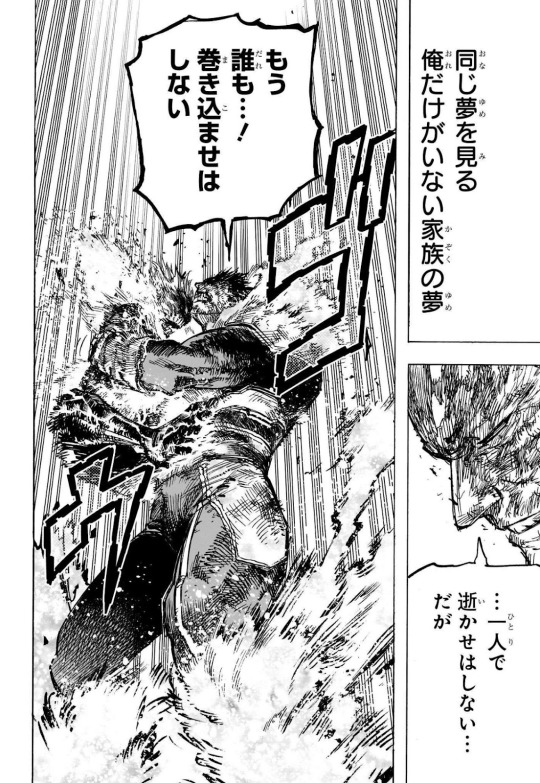
同じ夢を見る俺だけがいない家族の夢 おなじゆめをみるおれだけがいないかぞくのゆめ
= I dream the same dream of my family, but without me.
You might remember this line from No.249, where it or a variation of it appears twice, once at the beginning of the chapter and once at the end of the chapter. Here both scenes are, translated from Japanese into English for your convenience:
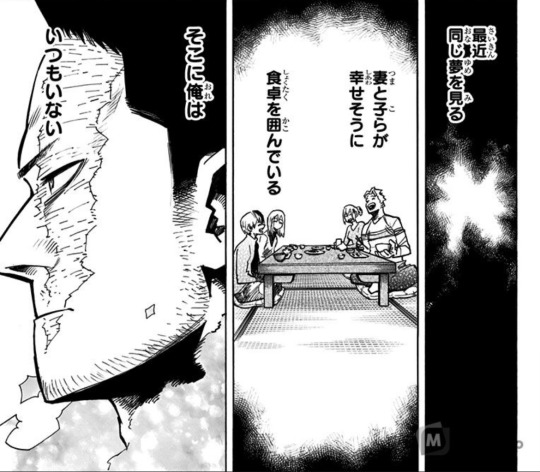
最近同じ夢を見る
= Recently [I] have the same dream.
妻と子らが幸せそうに食卓を囲んでいる
= My wife and children sit happily around the dining table.
そこに俺はいつもいない
= I’m never there [with them].

自分が家の為に今更何ができるのか
= What can I do [at this late stage, when it is already much too late] for the sake of my family?
最近同じ夢を見る
= Recently [I] have the same dream.
おまえもそこにいてほしかった燈矢
= [I] wish you were there too, Touya.
(That concludes our visit to the past. Let's jump back into the translation for No.387!)
…一人で逝かせはしない…だがもう誰も…!
…ひとりでいかせはしない…だがもう誰も…!
= “... I won’t let you die alone… but no one else…!”
巻き込ませはしない まきこませはしない
= “[We] won’t involve [anyone else]!”
Enji’s plea for Touya to not “involve” anyone else echoes Shouto’s call for the same in No.351-352 (except Shouto added “take it all out on us,” with “us” referring either to the Heroes or to the Todoroki family as a whole). Whether Shouto meant for Touya to direct his anger at the Heroes or at the Todoroki family in its entirety, he did NOT intend to be the only one on the receiving end of it. Shouto intended to limit the damage to himself and some others. Enji intends to limit the damage to just Touya and himself.

地上の移動では間に合わない ちじょうのいどうではまにあわない
= [They] won’t [be able to] evacuate [the area] above ground in time.
This might also be translated as “[I] won’t [be able to] cover enough ground in time,” as in Touya will explode before Enji can put sufficient distance between the two of them and everyone else to minimize the impact of the blast. He knows Touya is dying and plans to die with him as his father, but as a Hero (and the Number One Hero no less) he is still trying to save lives.
Note: The skin of Touya's chest and shoulders are breaking off. His body now resembles cracked earth disturbed by an underground volcanic eruption.

燈矢 おまえの火力も借りて空に——— とうや おまえのかりょくもかりてそらに———
= Touya, [I am] borrowing your firepower to [launch us] into the sky———
待て…待ってくれ…! まて…まってくれ…!
= Wait… please wait…!
もう少しだけ———! もうすこしだけ———!
= Just a little longer———!
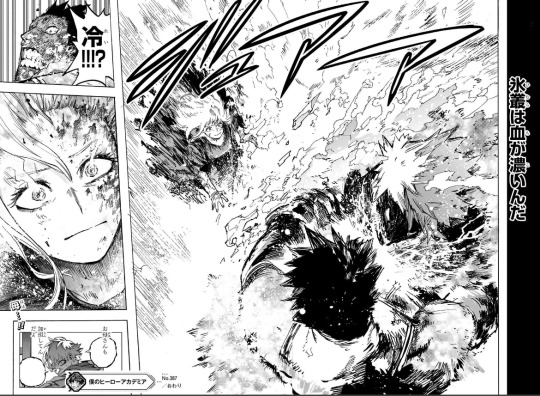
火叢は血が濃いんだ ひむらはちがこいんだ
= Himura blood is thick.
冷!!⁉︎ れい!!⁉︎
= “Rei!!!?”
This is Enji reacting to Rei’s presence, if that wasn’t clear by the close up of his face followed by hers. If you look closely at the position of Enji’s head on the right side of the panel you’ll notice that he has turned his face toward Rei, away from Touya. His expression is one of shock and horror. This is someone who has just learned that his son will explode, killing everyone within a large radius, from evacuees to Heroes and even other Villains. Everyone caught in the blast will be incinerated. Here he was hoping to save countless lives by limiting the damage to just himself and Touya (not unlike Shouto, who yelled for Touya to “take it all out on us” and not “involve” anyone outside the family), and here Rei is, pushing her way through the flames into the fray. If Touya burns, he, Enji, and Rei will burn together. That fits, because Enji doesn’t actually bear sole responsibility for Touya’s outcome now or then. Rei is his mother, and as his mother, she, too, bears that burden. Enji failed to be a “good enough” father to Touya, and Rei failed to be a “good enough” mother to him. As she said in No.302, she also didn’t see Touya. She also turned away from him. She also abandoned her son when he became more than she knew what to do with. So when he died at thirteen years old after enduring a decade of parental abuse and neglect, his blood was on her hands as much as on Enji’s, because she didn’t do enough to help him when he was at his weakest and most vulnerable. And look, I know Rei had it hard and was suffering, but she still had a responsibility to the children she helped to create to nurture, protect, and care for them, a responsibility she and Enji both fumbled. The sad reality is that parents can love their children and still fail to do right by them. Parents can want the best for their children and still not be the best for them. Touya suffered for having had Enji as his father, and he suffered for having had Rei as his mother. What has happened is on both of them. What happens next is on both of them.
お母さんも おかあさんも
= “[You] too, Mom.”
Literally, Touya says, “Mom too.”
加担してんだよ かたんしてんだよ
= “You’re complicit.”
End Tagline:
母…‼︎
はは…‼︎
[His] mother…!!
End.
#bnha manga#mha manga#bnha manga spoilers#mha manga spoilers#bnha 387#mha 387#dabi#touya todoroki#endeavor#enji todoroki#rei todoroki
28 notes
·
View notes
Text
日本のみなさん、こんにちは!
英語で書かれた海外ファン作品に戸惑ったことのある方は少なくないと思います。
この記事では、外国人の漫画アニメファンが、SNSにおいて自分の作品(小説、漫画、イラスト、アニメ等)を通して、ファン同士どのようにコミュニケーションをとっているかを分かりやすく解説しようと思います。
今回は食べ物に関する用語です!
けっこう頻出用語なので、満腹になりたい人におすすめの内容です。
イラストアカウントなのにfoodという単語を見た経験はありませんか。ファン同士の使うFoodという用語は、「作品の作り手が相手に見せるもの」を意味することがあります。これには、イラスト、同人誌、アニメーション、ビデオエッセイ、二次小説はもちろん、評価、批評など、あらゆることが含まれます。
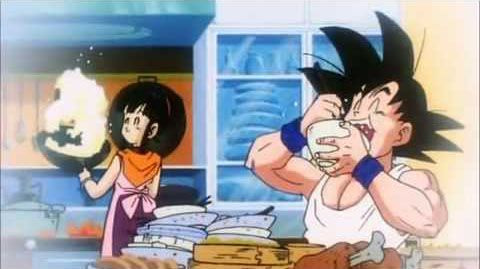
作品を作っている準備段階のことCooking(料理中である)あるいはin the kitchen(台所にいる)という場合もあります。cooking の短縮形cookin'が使われているかもしれません。

例) I’m cooking the next panel now. (いま次の漫画の原稿描いてるところ。)
Hungry (腹ペコ)を使って、
I hope you're hungryというと、「あなたがお腹が空いているといいな」つまり「(今制作中のものについて)楽しみにしていただけると嬉しいです」「乞うご期待」といった意味になります。他にも、
I'm preparing good food, y'all hungry? (良い作品を準備中なのでお腹を空かせて待っててね)という表現は、クリエイターが現在準備しているものについて、フォロワーやファンをからかうときによく使われます。

何かのイベント前にはfeastという単語がよく見られます。feastは、「ごちそう」という意味ですが、ニュアンス的には「いきなりたくさんの食べ物が出る」感じです。
例えばサイヤの日(3月18日)が近くなったら、"Prepare for the feast!"みたいな感じで伝えると盛り上がります。

R18(英語ではNSFWの表記が一般的)のコンテンツに感想を言いたい時は、spicyやhotが使えます。スパイシーと聞くと辛口評価を連想するかもしれませんが、そのような否定的な意味はなく、自分にとってキャラクターやシチュエーションが魅力的すぎる時に使う用語なのです。”It’s hot(spicy) food, I’m so thirsty now" などと言って、口渇を覚えるほどホットであると表現することもあります。👄や👅や💦などの絵文字を使ってもいいです。
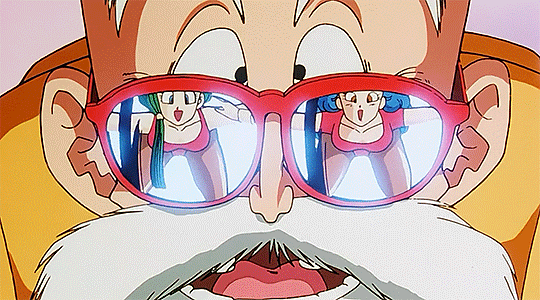
また、料理人(クリエイター)が料理(作品)を作るために使用する材料、すなわち、美術のテクニックやストーリーのアイデア、独創的なコスチューム、などについて話していることもあります。
例えば、公式ストーリーやキャラクターがちょっと理解し難かったり予想外だったりすると、以下のように「ちょっと待て、俺に料理させろ」と言って、ファンならではのアイデアで二次創作することがあります。hollup は hold up の短縮形で、「ちょっと待って」"という意味です。
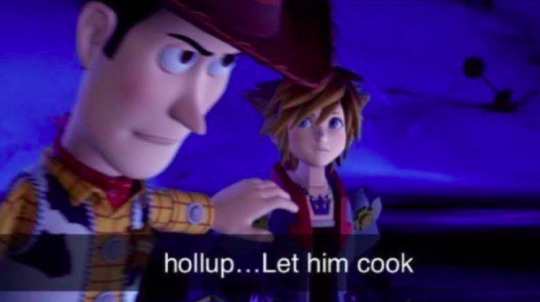

(source)
例:
絵師: Uhmmm, I want to do a Cell-but-human design… (うーん、人間ぽいデザインのセル描こうかな)
フォロワーA: Oh, noooo! lol Don’t do it!(マジかw やめてー)
フォロワーB: No, wait, let him/her cook. (いやいや、描いてみたらいいじゃん)
その他、WIPという表記とともにプレビューやドラフトを投稿しているのを見かけることがあります。これはwork in progress、つまりクリエイターが、作業中の内容をフォロワーに見せている場合です。フォロワーは、待ち切れないということを伝えるために、よく以下のようなリプをすることがあり、これは英語圏では全く失礼なことではありません。

辛抱強く待つ
"I'm at the table. Smells delicious!" (テーブルに着席中。おいしそうな匂いがするわー)
"I'm starving (hungry), serve me!"(お腹空いたんですけど、何か出してー!)
“Serve the food!" や "Cook faster!"といったバリエーションもあります。
公式が出しているもの、特にシリーズ物については、こんな表現をすることがあります。
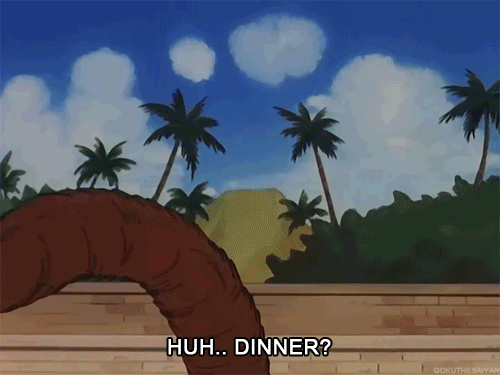
"What is Toyotaro cooking?!"(とよたろう先生は何を作っているのだろう)
これは、驚きと戸惑いを表現したい場合に使います。
"SDBH's food is delicious this week!" (今週のSDBHのエピソードはおいしいよ)
これは、まだ読んでいない人にお勧めする場合に使えます。
時には、自分の感情を表現するために、GIFやさまざまなリアクション画像を投稿する人もいます。

日本人には少し刺激的かもしれませんが、腐った食べ物、まずそうな食事など、ネガティブな画像を使うこともあります。
ネット文化になった料理番組や有名シェフもたくさんいます。中でも欧米で大人気の3ツ星シェフ、ゴードン・ラムゼイは、キレのある毒舌で有名で、テレビにもよく出ているのでご存知の方も多いのではないでしょうか。

これは、ラムゼイが残念な料理をさんざん食べさせられ失望し嫌気がさしていたところへ、ついに超絶品料理にありくことができてホッとしている様子を表しています。外国人はよく、「Finally some good fucking food」と言って長い苦しみからついに解放されて得た喜びを表現することがあります。
これをファンの創作作品の下にコメントすると、こういう意味になります。
「公式にはホント失望させられたけど、二次創作のおかげでやっと満腹になった!」
欧米ならではのユーモアのある辛口コメントですね。
ドラゴンボールでは食べ物にまつわるダジャレが多く登場し、英語圏の人もすでにそれをわかっているので、食べ物に関する話題を通して、ファン同士より楽しむことができますね。
海外ファンはネットに投稿された作品に躊躇なくコメントします。しかし、自動翻訳機を使っている場合、スラングを上手く訳せません。
もし日本の皆さんの中で、外国人が何を言っているのか、褒められてるのかディスられてるのかすらわからなくて困っている場合は、いつでも私に聞いてください。私はスペイン語、フランス語、英語に対応可能です。ポルトガル語やイタリア語も大丈夫です。
お役に立てたなら幸いです。
Von~
@aolihuiさんには、このテキストでとても助けられました、ありがとうございました!
27 notes
·
View notes
Text
TALES OF THE RAYS: LUKE’S 3RD SKIT (ENGLISH TRANSLATION)
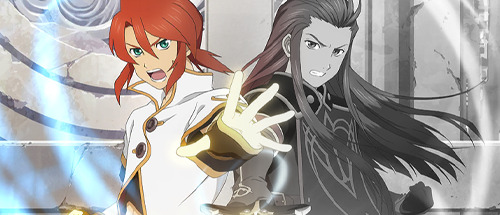
Masterpost
I was initially going to upload these yesterday morning, but some personal life stuff came up and I had to delay it. Here is the Luke side of the skit released with the debut of his xMA \ Dual Mystic Arte with Asch.

Luke: Guy told me that you’re interested in Abyssman, Hubert. That true? ガイから聞いたぜ。ヒューバート、アビスマンに興味があるんだって?
Hubert: Guy, you didn’t have to…! …I’m just interested in trivia, that’s all. It’s not like I’m a fan of Abyss Red or— ガイさん、余計なことを……!……こほん、あくまで雑学として関心があるだけです。アビスレッドが好きだなんてぼくは一言も——
Luke: Abyss Red? Wow, Hubert, you actually know a lot about it. All I did was mention Abyssman. アビスレッド?なんだ。ヒューバート、意外と詳しいんだな。俺、アビスマンとしか言ってないのに。
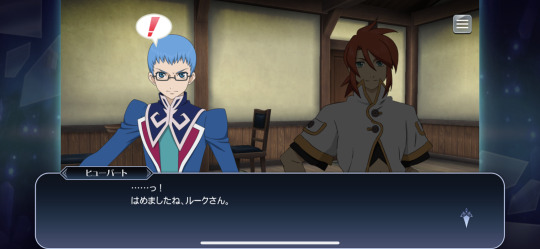
Hubert: …Tsk! Luke, you lured me into a trap. ……っ!はめましたね、ルークさん。
Luke: Whoa, that’s a scary face! That’s not what I was trying to do. But, I’m sorry if I offended you. My bad. 顔、こわっ!そんなつもりじゃねーよ。けど、気を悪くしたなら謝る。ごめんな。
Hubert: …No, I apologize for getting worked up. But if this information spreads around and reaches my brother’s ears, it’ll be troublesome… ……いえ、ぼくの方こそ熱くなってすみません。しかしこの話が広まって、兄さんたちの耳に入りでもしたら、面倒なことに……。
Luke: Do you have a problem with Asbel? About heroes? アスベルたちは嫌いなのか?ヒーローもの。
Hubert: I don’t think so. I simply don’t want to be treated like a child by people just because I happen to like tokusatsu superheroes. * 嫌いなわけではないと思いますがぼくが偶像ヒーローを好むことで、いたずらに子供扱いされるのはしゃくですからね。
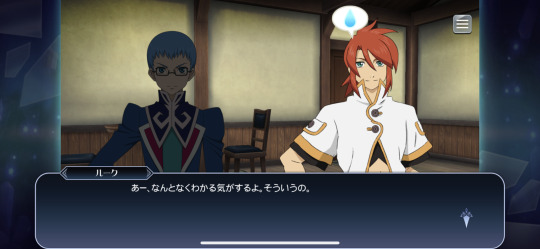
Luke: Ah, I think I know what you mean. I get it. あー、なんとなくわかる気がするよ。そういうの。
Hubert: By “I get it”, do you mean you understand what it’s like to be “treated like a child?” そういうの、とは『子供扱い』のことですか?
Luke: Oh yeah. I mean, what’s with the way people who act like big brothers treat everyone slightly younger than them like they’re little kids? そうそう。なんつーか、年上の兄貴風吹かせてくる奴って年下のことをすぐ子供扱いしてくるよな。
Hubert: Luke… It seems that we have an understanding. In your case, might I ask who is giving you this “big brother” vibe? ルークさん……。あなたとはわかり合えそうです。あなたの場合は一体誰が『兄貴風』を吹かせてくるんですか?
Luke: Ahh, well, Guy used to be the loudest, but lately it’s been Asch… I guess it might be because we pretended to be twins for a while. ああ、昔はガイがうるさかったんだけどよ、最近はアッシュがさー……。一時期双子のふりをしてたからなのかな。
Luke: Sometimes, I get pretty annoyed about how Asch’s lectures are starting to sound more like he’s my father than my brother. Or, well… 小言の内容がいちいち兄上っつーかむしろ父上っぽくなってきてムカつくことがあるっつーか。まあ、だけど……。
Hubert: …But, you don’t feel sorry at all? ……悪い気はしない、と?
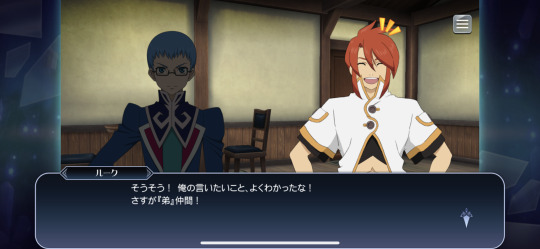
Luke: Exactly! You know exactly what I’m saying! Just what I’d expect from a fellow “little brother”! そうそう!俺の言いたいこと、よくわかったな!さすが『弟』仲間!
Hubert: …I understand. No matter how old I get, no matter what world I go to, I will always be his little brother. ……わかりますよ。きっと何歳になっても、どの世界に行ってもぼくは兄さんの弟なんでしょうね。
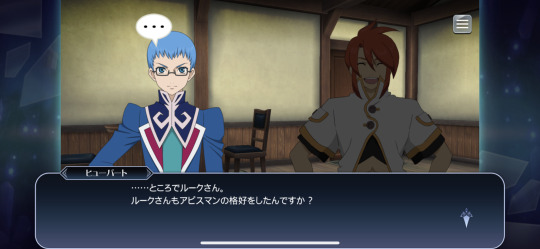
Hubert: …Anyway, Luke. Didn’t you dress up as an Abyssman once? ……ところでルークさん。ルークさんもアビスマンの格好をしたんですか?
Luke: Oh yeah! I did! I’m Abyss Red. Guy is Abyss Orange, and Asch is Abyss Sil— ああ、したぜ!俺はアビスレッド。ガイはアビスオレンジで、たしかアッシュはアビスシル——

[ Asch enters ]
Asch: —I wondered where you’d wandering off to, and here you are, talking nonsense. ——どこをほっつき歩いているのかと思えばこんなところで無駄口を叩いているとはな。

Luke: Why are you putting it like that!? It’s not like we’re gossiping or anything. Your name just came up. So, what do you want? なんだよ、その言い方は!つーか、噂をすればなんとやらだな。ちょうどアッシュの話をしてたんだ。で、なんか用か?
Asch: Were you born with sawdust for a brain? You’re on shopping duty today, Luke. And don’t you dare push it off on Guy! 貴様の頭の中にはおがくずでも入ってるのか?今日は貴様が買い出し当番だろうが。ガイに迷惑をかけるんじゃねえ!
Luke: Ah—oh, that’s right! Thanks for coming to get me. I’ll be right there. あ、いっけね!そうだった!呼びに来てくれてありがとな。すぐ行くよ。
Asch: Of course. If you’re late, the one who cooks will be in trouble this time. You need to start thinking ahead more! 当たり前だ。貴様が遅れると今度は料理当番の奴が困るんだからな。少しは先のことまで考えて行動しろ!
Hubert: …Luke, you’re completely right about him. ……ルークさんの言ったとおりですね。

Luke: Hehe. Right? へへっ。だろ?
Asch: …What are you talking about? ……何の話だ。
Luke: It’s nothing. All right, I’m off to go shopping! 何でもない。じゃ、買い出しいってきまーす!
Asch: Listen up. Don’t take a detour, but make sure you still get back quickly. And don’t buy unnecessary food so you can eat it. Understand!? いいか。寄り道しないでさっさと帰ってこいよ。余計な買い食いはするな。わかったな!
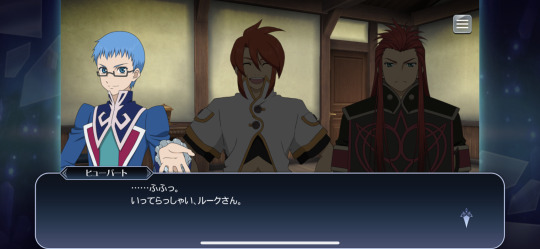
Hubert: …Fufu. Have a pleasant day, Luke. ……ふふっ。いってらっしゃい、ルークさん。
* Tokusatsu is a genre of Japanese live action film or television show that makes use of lots of practical effects. Hubert is a fan of shows that are like Power Rangers or Kaimen Rider. Abyssman is a nod to these types of shows.
#tales of the rays#totrays#luke fon fabre#asch the bloody#hubert oswell#tales of the abyss#tota#tales of graces#tog
43 notes
·
View notes
Text
Words from Nukoduke, vol. 4, part 4
Words in bold are particularly relevant to the story, and words in italics seem like they’d be worth remembering outside the context of the manga. Bold and italic together means they’ve probably appeared somewhere in Nukoduke more than once. Kinda long list but it’s for a whole volume… actually it’s too long for tumblr, so splitting into four parts.
供え物 そなえもの offering (e.g. to the gods), votive offering / ofrenda 誠実 せいじつ sincere, honest, faithful / sincero, honesto, fiel 重視 じゅうし regarding as important, attaching importance to, taking a serious view of, putting emphasis on / importancia 作務衣 さむえ, さむい samue, monk's working clothes 匂わせる, 臭わせる におわせる to give off (a smell, scent, aroma), to smell of, to perfume (a room, etc.), to hint at, to suggest, to insinuate 天然 てんねん nature, spontaneity, natural airhead / natural (belleza, gas) 未亡人 みぼうじん widow / viuda 純文学 じゅんぶんがく pure literature, belles-lettres 茶葉 ちゃば tea leaf, tea leaves ようやっと finally, at last, at length, barely, narrowly, hardly, only just 威圧感 いあつかん intimidating air, sense of intimidation 人望 じんぼう popularity 嬉々, 嬉嬉, 喜々, 喜喜 きき merry, joyful, gleeful / contento, satisfecho, alegre 引っかく, 引っ掻く, 引掻く ひっかく to scratch, to claw / arañar, rascar, rasguñar 野性 やせい wildness (plants, animals, etc.), uncouth, rough, unpolished / silvestre, salvaje 看板娘 かんばんむすめ pretty girl who attracts customers to come inside a shop ぴちぴち, ピチピチ bursting with youth and energy (esp. young woman), vivaciously young, spunky, energetic, (fish) jumping around energetically (e.g. when caught in a net), bursting (e.g. seams), tight, splattering (e.g. cooking oil) 男勝り, 男まさり おとこまさり (of a woman) strong-minded, spirited, mannish / (de una mujer) mentalidad fuerte, animada, hombruna 舎弟 しゃてい one's younger brother, underling (e.g. in yakuza), junior male peer, sworn younger brother 寡黙 かもく untalkative, quiet, taciturn, reticent, uncommunicative / callado, tímido 女房 にょうぼう, にょうぼ, にゅうぼう wife (esp. one's own wife), court lady, female court attache, woman who served at the imperial palace, woman (esp. as a love interest) / esposa 僭越ながら せんえつながら by your leave, with your permission ちまちま small, compact 狭き門 せまきもん the strait gate (in the Bible), the narrow gate, high barrier (to enter a highly competitive school, company, etc.), difficult hurdle, difficulty, obstacle ひた隠し, 直隠し ひたかくし hiding at all costs, desperate cover-up, doing one's best to keep (something) secret ひた隠す, 直隠す, ヒタ隠す ひたかくす, ヒタかくす to cover, to cover up 独学 どくがく self-education, self-instruction, self-study / estudiar de modo autodidacta, autoaprendizaje 快諾 かいだく ready consent 厳格 げんかく strict, severe, stern, rigid, rigorous, tough / serio, duro, severo, inflexible, rigor, austeridad 涙腺 るいせん tear gland, lacrimal gland 資格 しかく qualifications, requirements, capabilities / calificaciones, requerimientos, capacidades 暴挙 ぼうきょ violence, reckless action, (an) outrage 古株 ふるかぶ old-timer, veteran, senior, old stump, old roots 息抜き いきぬき taking a breather, relaxation, vent hole 吹き出す, 噴き出す, 吹きだす, 吹出す, 噴出す, 噴きだす ふきだす to spout out, to spurt out, to gush out, to jet out, to sprout, to bud, to burst into laughter, to blow (smoke, etc.), to send out shoots (of a tree) / brotar, soplar hacia afuera, empezar a soplar 実体験 じったいけん real experience, actual observations 天才肌 てんさいはだ (person) seeming like a genius, (having) the temperament of a prodigy 急ぎ足, 急足 いそぎあし fast pace, quick pace
#these are almost all from the author's note#this one's all about how the author became a mangaka it's very sweet#Nukoduke#vol 4 part 4#vocab#Japanese in manga#I think vol 4 is when it starts to really get good (at least when I started to get more attached to it)
5 notes
·
View notes
Text
2024年2月25日(日)
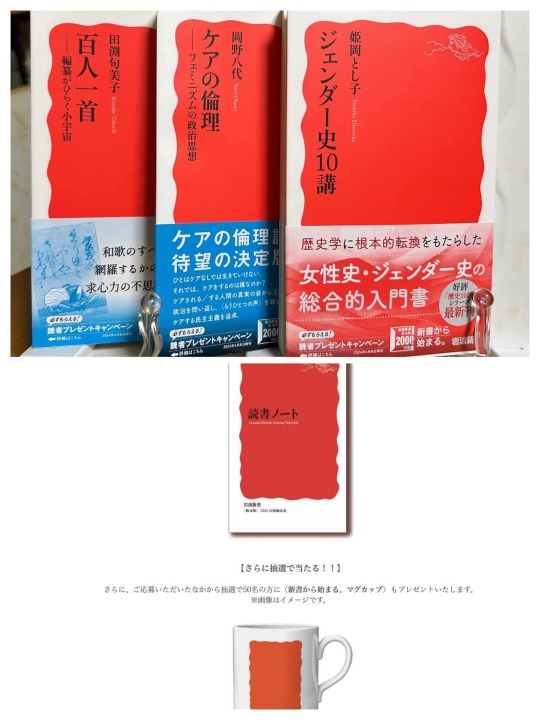
いまや文庫も新書もどれくらいの種類があるのかまったく知らない。だが、私が読書を始めた中学生の頃には、岩波書店の独壇場だった。その岩波新書の<新赤版2000点突破!>を記念して、特製<読書ノート>をプレゼントするとのこと。早速3冊ゲットして応募券を葉書に貼って出そうとしたが・・・、普段葉書など使わないのでストックがない。雨の中買い物に出ようと考えたが今日は日曜、仕方ない、明日の朝一番で葉書を買って応募しよう!
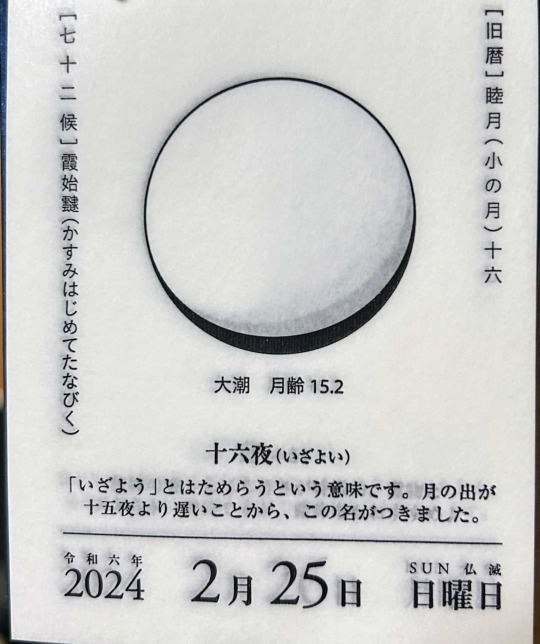
5時45分起床。
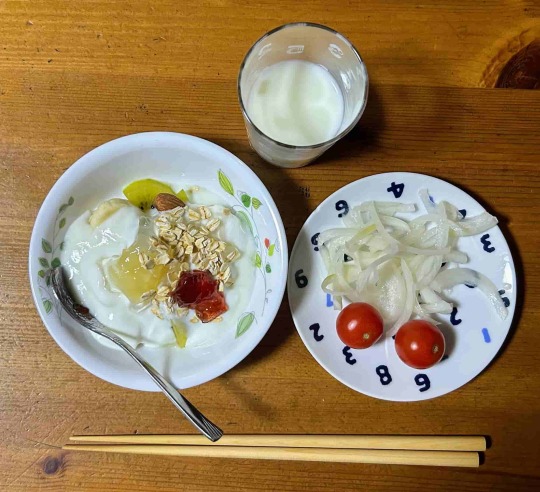
朝食。
洗濯。
ごぼう茶煮る。
奈良での太鼓の練習に向かうツレアイを、近鉄東寺駅まで送る。
<Threads>に露の新治出演情報をポストする。
<YouTube>と<note>で、トラベラーズノートの使用例を渉猟する。

ランチ、次男と私はうどん、三男はラーメン。
近鉄東寺駅までツレアイを迎えに行く。
彼女は雨の中を、あちこち買物に走り回る。

トラベラーズノートには、もちろん多彩なリフィルが用意されているが、既存のノートや手帳を挟み込んで使うという事例が沢山見つかった。面白いのは、レギュラーサイズにはPlus社の<Ca.CresSystem>のノートを、パスポートサイズには無印良品の<パスポートメモ>を使う人が多く居ることだ。糸綴じでノートが180°近く開くので書きやすく、はさむだけにしておいて実際に書くときはそれだけ取り出して使用するという方法が便利そうだ。
東京の落友・Nさんに送る定期便、ブルーレイのディスク2枚を用意したが、うち1枚が開けない。原因はわからないが、残り僅かの容量にデータを圧縮して書き込んだことが影響している気がする。次回からは、けちらずに余裕を持ってディスクを使おう。
私が夕飯を用意している間に、ツレアイと三男でココに点滴。
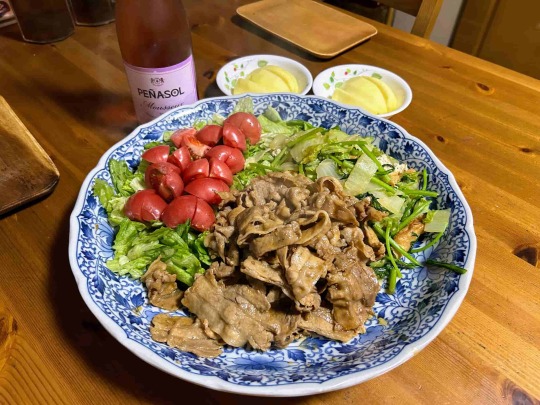
豚バラ肉の焼肉風・白菜と春菊と薄揚げの炊いたん・レタスとトマト・焼きホッケ+リンゴ、スパークリングワイン。
録画番組視聴、落語研究会から「天狗刺し」桂二葉。
名探偵ポワロから、
第1話「コックを捜せ」/ The Adventure of Clapham Cookシーズン 1, エピソード 1 ある朝、ヘイスティングスは新聞に掲載された事件をポワロに読んで聞かせるが、どれもポワロの興味を引かず、手持ちぶさた状態。そんな時、ポワロを尋ねて トッド夫人が事件捜査の依頼にやって来る。彼女は居なくなったコックのイライザを捜して欲しいと相談を持ちかける。渋るポワロだったが、依頼を引き受ける ことに。
シリーズ第1作、みんな若い。
片付け、入浴、体重は650g減。

連日の寒さを考慮すれば、まずまず。
パジャマに着替えて、日誌書く。今日までは、appleのメモ帳にメモを書いてそれをベースにしていたが、明日からはTRP(トラベラーズノート・パスポートサイズ)にメモをとることにする。

終日の雨、彼女の送迎以外は外へ出なかった。水分摂取量も、かえってストレスとなりやすいので止めることにする。
4 notes
·
View notes
Text
シスタークラリスの奇妙な一夜
Sister Clarith's Curious Night (Nervous Night)
彼女がそのレストランを訪れたのは
She had visited this restaurant
行方不明の子供たちを探すためだった
To search for some missing children
噂を聞いたのだ
She had heard a rumor
孤児院の子がこの店に入っていくという
That the children of the orphanage had been seen
その姿を見たと
Entering this establishment
.
しかし応対した支配人の男は
But the manager who came to receive her
残念そうに首を横に振る
Regretfully shook his head
「そのような心当たりはありませんね」
"I wouldn't know anything about that"
それを聞いてがっくりと
Upon hearing that, the Sister
肩を落とすシスター
Dropped her shoulders, crestfallen
.
すると支配人は彼女を
When she did, the manager
レストランの一番良い席に座らせた
Ushered her over to sit in the best seat in the restaurant
「せっかくですから
"Since you're here
何か食べていってください
Please, have something to eat
......ああ お代なら結構ですから」
...Ah, it's on the house"
.
ありがたきお言葉
I'm quite grateful to hear that
実は昨日から
The truth is,
何も食べていません
I haven't eaten since yesterday
子供たちが心配で
Out of worry for the children
.
厚意に甘える事にしたシスターの前に
The Sister decided to presume upon his kindness
やがておいしそうな料理が運ばれてきた
And eventually she was brought a delicious-looking meal
白身魚のソテーだろうか それを見て
It looked like a sauteed white fish; when she saw it
彼女は申し訳なさそうに
She apologetically
うつむいてしまった
Cast her eyes down
.
「教えにより
"According to our teachings,
生き物の肉は口にできないのです」
I mustn't partake of the flesh of anything living."
シスターがそう断っても
Though the Sister demurred,
支配人は引き下がらない
The manager was persistent
「そんなことをおっしゃらず
"Now don't be that way,
ここは神の目も届かぬ森の中ですから」
The eyes of your god can't reach you here in the forest"
.
仕方なくシスターは
Reluctantly, the sister
ナイフで魚の身を切る
Cut into the fish's body with a knife
一口だけ食べて帰ろう
She'd just take one bite and head home
そんな風に考えていたところ
But as she was thinking this
彼女は料理の中に
She discovered that
何か固い物がある事に気が付いた
There was something hard inside the meal
.
シスターの顔が青ざめる
The Sister's face paled
それはレーナが身に着けていた
That was a brooch that Lena
ブローチだった
Had always worn on her person
泳ぐのが得意なレーナが
Lena was good at swimming, and
海で集めた小石を
She had made it herself
組み合わせて作った手作りの物だ
By joining together pebbles she'd gathered from the sea
.
どうしてこんな物が
What is something like this
料理の中にあるの?
Doing inside this dish?
少なくともあの子は
At the very least, that child
この場所に来ていた
Must have come to this place
.
ふと気が付くといつのまにか支配人の姿は
She suddenly noticed that the manager
店内のどこにも見えなくなっていた
Was nowhere to be seen inside the restaurant
胸騒ぎを覚えた彼女は思わず席を立ち
With a sense of unease she unthinkingly stood from her seat
店の奥へと忍び込んでいったのだ
And crept further into the back
.
途中の廊下で小さな靴が落ちていた
Partway through the hallway she found a small dropped shoe
シスターは再び青ざめる
The sister paled once again
それはマルクの靴だった
That was Mark's shoe
彼の足が速かったことを彼女は思い出す
She recalled that he'd been a fast runner
.
ひときわ異臭が漏れる扉の前に立ち
She stood before a door leaking a notably pungent odor
シスターは恐る恐るそれを押し開ける
The Sister timidly pushed it open
そこは血と肉のこびりついた調理場
Inside was a kitchen splattered with blood and meat
コックの顔をした男の顔は
The face of the man who looked to be the cook
毛むくじゃらだった
Was covered in thick fur
.
二本足で立つ
You, dog man who
犬の獣人よ
Stands on two legs
包丁についた血は
That blood on your kitchen knife
いったい誰の物?
Just who does it belong to?
.
作業台の上で赤い猫が
On the work counter, a red cat
皿のシチューを舐めている
Was licking up a bowl of stew
浮かんでいる具材は
The ingredients floating in it
間違いなく人間の指だ
Were, without a doubt, human fingers
無数の指の中の一つ
Among the countless fingers
そこにはめられた指輪を
The sister found one
シスターは見つけた
That was wearing a ring
.
あれはエマの物で間違いない
She was certain that it belonged to Emma
恐ろしい想像がシスターの脳裏を駆け巡る
A dreadful image flashed through the Sister's mind
振り返ったシスターの前に立っていたのは
When she turned around, standing before her were
二羽のウサギと巨大な熊だった
Two rabbits and an enormous bear
.
シスターは叫び声をあげ
The Sister let out a scream
その場に倒れこんだ
And collapsed on the spot
薄れゆく意識の中
In her fading consciousness
徐々に迫ってくる絶望の足音
Despairing footsteps steadily encroached on her
気を失う直前 彼女が見たのは
Right before she passed out, she saw
額に角を生やした少女の顔だった
The face of a girl with a horn on her forehead
.
目を覚ました時
When she awoke
彼女は孤児院に帰ってきていた
She had returned to the orphanage
そしてその後
And shortly after
行方不明の子供たちも全員
All of the missing children
無事に孤児院へ戻ってきたのだ
Safely came back as well
.
子供たちは数日間の記憶を失っており
The children had no memory of the past few days
そして とてもお腹を空かせていた
And they were very hungry
レーナやマルクたちが唯一覚えていたのは
The only thing Lena and Mark and the others could recall
フルートを持った
Was a pair of twin rabbits
双子のウサギの姿だけだった
Who had been holding a flute
.
あのレストランは建物ごと
That restaurant, and the building it was in
森の中から姿を消した
Vanished from the forest
まるで最初から
It was as though
存在していなかったかのように
It had never existed in the first place
そして
And
平穏な日常が戻る
Their peaceful days returned
.
子供たちのためにおやつの
While baking some brioche
ブリオッシュを焼きながら
For the children's' snack
シスターはこんなことを考えていた
The Sister began to wonder
.
もしもあの時
If, back then,
出された料理を口にしていたならば...
I had actually eaten any of the meal that had been set out...
私は一体どうなっていたのだろうか?
Just what in the world would have happened to me?
#()songs#()mothy#()E.A.T.#the thing you need to keep in mind is that most of this one is spoken and not sung#unfortunately the music is very good and a big part of it so you are missing out on that a little
58 notes
·
View notes
Text
レポート 親子で参加!農業体験ミステリーバスツアー
夏休み企画の「農業体験ミステリーバスツアー」があり、8月6日(日)に息子と参加しました。
到着まで目的地は秘密。「農業」といっても、米も野菜も畜産もありますから、どこに向かうのかドキドキ。
結果から申し上げると、今回は、オーガニックの卵を生産する養鶏所と、最先端の植物工場、を見学したあと、農産物加工品のお買い物を楽しんで、最後に地元食材をたっぷり使ったスペシャルランチを食べました。詳細は下記からどうぞ!
一ヵ所目「ファーム アグリコラ」
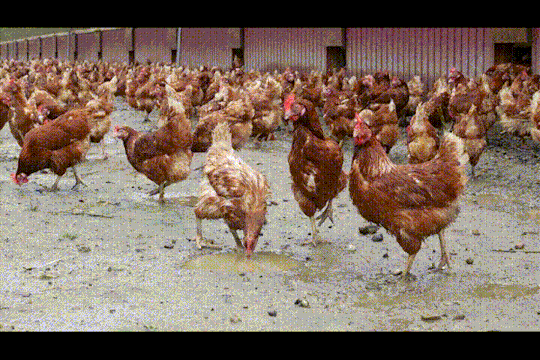
ファーム アグリコラは、札幌の隣町「当別町」にある養鶏所です。代表の水野さんが、アグリコラの特徴や、大切にしていることを話してくださいました。
アグリコラのこだわり01「飼料も国産オーガニック」
日本の飼料はほとんどが輸入。輸入飼料の大豆やトウモロコシは一般的に、遺伝子組み換えが使われています。アグリコラの特徴は、輸入飼料ではなく、国産飼料を使っていること。近隣の有機栽培をしている生産者と連携しているそうです。
また、人間と同じくニワトリも、腸内環境を良くすることが重要だそうで、サツマイモを発酵させた餌も食べさせています。
見た目ウケのために黄身の色を濃くしないので、飼料に着色料を混ぜたりもしていません。
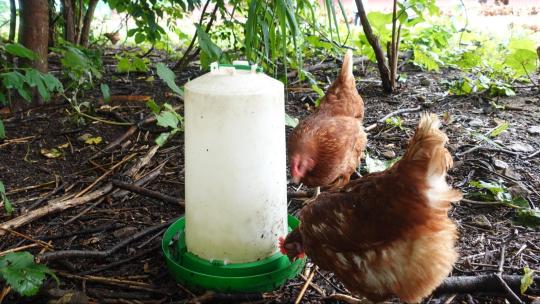
水野さんのこだわり02「平飼い、放牧」
アグリコラでは、人も家畜も心身ともに健康であることを大切にしています。そのため、平飼い&放牧スタイルをとっているそうですが、おかげで鳥インフルなどかかることもなく健康なんだそうです。
キッズの質問「平飼いと放牧って何が違うの?」
「鶏舎の中で放し飼いの状態で飼育するのが平飼いで、屋外でニワトリたちが外で自由に走り回れる状態の飼育が放牧です。」と水野さん。
一般的な養鶏の「ゲージ式」は、一羽あたりiPad一台分程度の広さのゲージの中で過ごし、鶏舎には窓がないそうです。
アグリコラのニワトリは、土を掘ってみたり、草をついばんだりする姿がほほえましく、みんな元気いっぱい。ずっと見ていられるくらいかわいかったです。

水野さんが大切にしていること03「農福連携」
「アグリコラは、障害のある方が活躍できる農福連携の取り組みを行っています。」と水野さん。
就労継続支援A型事業所、つまり障害のある方も「仕事として」農業に従事できるということです。
「持続可能な農業」は、言葉にすると短いですが、ここに至るまでの相当なご苦労があったはず。人とニワトリの健康、食べ物としての品質、環境、きれいごとではなく全部大切にしながら、商売としても成立させていく。本当にすごいなぁと思いました。
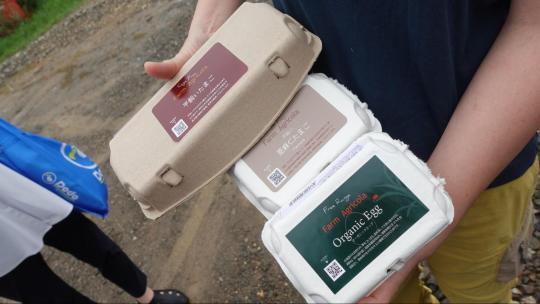
キッズからの質問タイム
Q. ニワトリは一日に卵を何個生むの?
水野さん「1日一個生めばいい感じです。ニワトリは25時間ごとに一個生みます。なので、毎日ちょっとずつ生む時間が少しずつずれて、午後3時くらいになったらその日は生むのをお休みします。なので、10日間で8~9個生みます。」
Q. このニワトリの卵からはヒヨコは生まれるの?
水野さん「ここにはメスのニワトリしかいません。メスのニワトリだけで卵を生むのだけど、人間と同じく、赤ちゃんが生まれるためにはオスのニワトリの精子が必要です(受精)。この卵は受精していないため、卵は孵らないのです。」
Q. ニワトリは何年くらい生きているの?
水野さん「ニワトリにも寿命があります。ただ、人間のおばあちゃんが赤ちゃんを生まないように、ニワトリも齢をとると卵を生めない身体になるの。私たちはニワトリからもらった卵を売ってお金にしています。ニワトリから卵がもらえなくなってしまうと、お金にすることもできません。なので、ニワトリには申し訳ないけれど、役目を終えてお肉になるということをしています。ちょっと悲しいけれどね。」

二カ所目 現代式トマト栽培!?「Jファーム」の植物工場
夏は野菜がたくさん収穫できる季節ですが、北海道の冬は雪が積もります。当たり前ですが、冬は野菜の露地栽培ができません。一年中安定して栽培するために、巨大なハウスの中でトマトを栽培するJファームの「植物工場」を見せていただきました。場所は、札幌市東区。
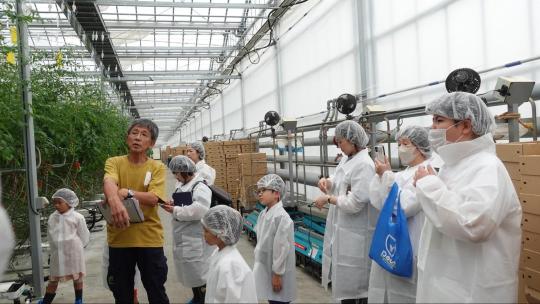
苗の見た目にビックリ!
中に入ってまず驚いたのが、ミニトマトの苗の背の高さ!全長はなんと7メートルくらいあり、長~いトマトの苗を天井から紐を使って吊るるように支えて、光の当たりやすい高さに調整しています。家庭菜園だと、1.7メートルくらいの苗を支柱で支えているので、その違いに驚きました。そして7メートルもあるのに、茎の太さは親指程度しかなく、思ったよりも太くないことに驚きました。
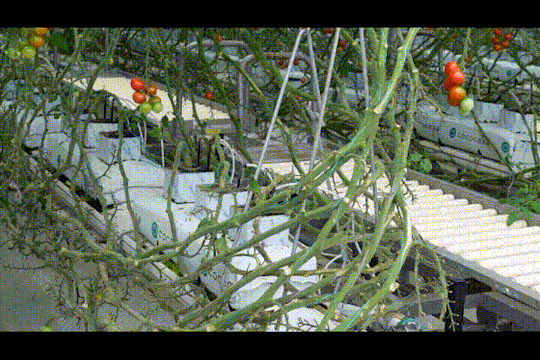
トマトの生育環境に合わせて徹底管理
ハウスの中に入ると、モワッとした熱気が立ち込めるのかと思いきや、意外と過ごしやすい温度帯。この日がた��たま涼しい日だったというのもありますが、トマトが生育しやすい環境に温度管理は徹底しているのだとか。「水は肥料分を溶かしたものをチューブを使って与えています。時間帯や量を管理し、あえて根元が乾く時間帯を設けています」と工場長。
トマトの原産はアンデス山脈の乾いた高山地帯ですから、「暑すぎない」「乾いている」という環境をハウス内で作り出しているということですね。
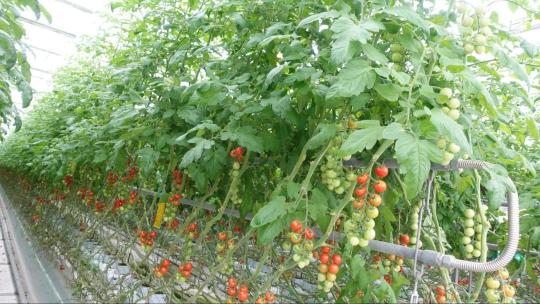
収穫量は一日4トン!
今回見学させてもらった品種は、「ダルダリー」というオランダ産のミニトマト。苗が長持ちするため、長期間の収穫にむいている品種ということで、今年から取り扱いを始めたそうです。
収穫量は現在、多い日で一日4トン程度。さらに最終目標は、その3倍以上の収穫量を設定しているそうです。
キッズの質問「もっといっぱい収穫するには、栄養の量を増やせばいいの?」
工場長「重量を上げるには、栄養も関係するけれど、二酸化炭素の量も大切です。光合成に必要なのは二酸化炭素。だから天井の窓を開けてハウスの中に外気を取り入れる調整が欠かせないのです。窓はコンピューターで自動制御しています」
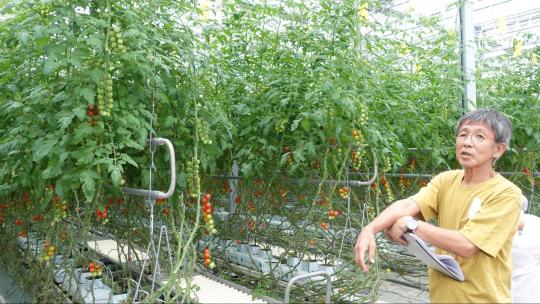
ちなみに、工場というイメージから収穫作業は機械なのかと思いきや、昇降機にのって人が手摘みしているそうです!
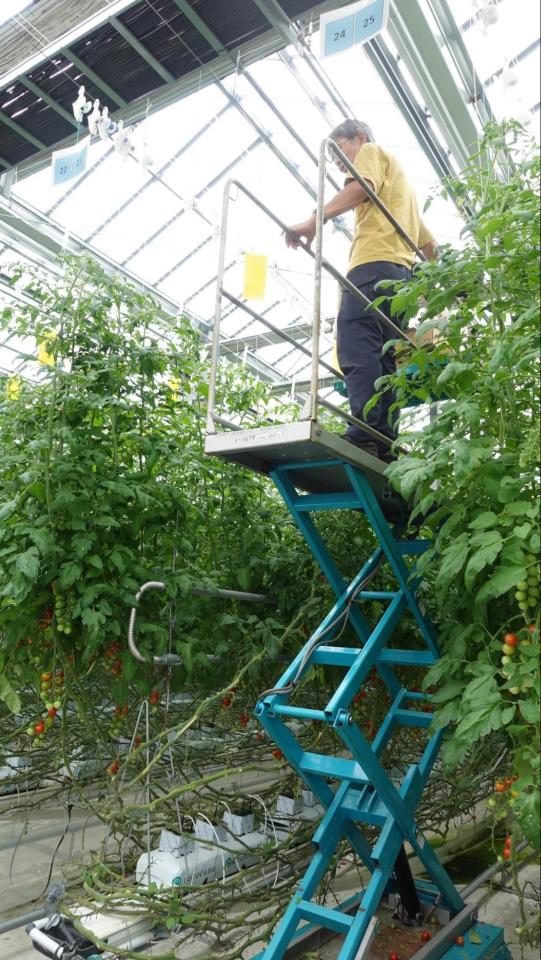
車内では「野菜○×クイズ大会」
移動車の中では、○×クイズ大会。大人でも迷うくらいの絶妙な問題で、大盛り上がり。
司会の“みっちゃん”がさらに盛りあげてくれて、目的地まであっという間に到着する楽しい時間を過ごしました。

思春期に突入した息子。周りよりも少しお兄さんだったため、最初は遠慮がちでしたが…しっかり楽しんでいるし(笑)
お待ちかねのランチタイム!
「サッポロさとらんど」に戻り、調理室でランチタイムの準備開始!部屋に入るとスパイスの匂いが…お、お腹が空いちゃったよ~!
サラダ作りプチ講座
子どもたちは、各家庭分のサラダづくりにチャレンジ!レタス類もフリルやベビーリーフなど何種類かあって、少しずつ形が違うだけで、玉レタス一種類だけで作る時と比べて見栄えが良くなることもわかりました。そして、野菜ソムリエプロの大澄さんが、サラダを美味しく作るコツを教えてくれました。
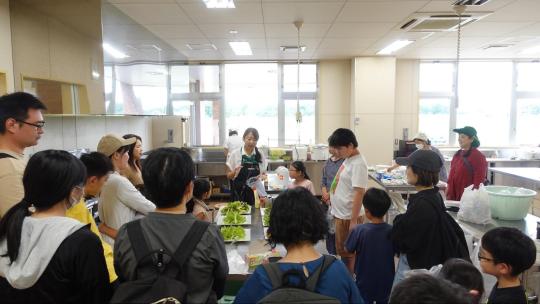
美味しくなるポイント01「レタスのちぎりかた」
大澄さん「コツは、横にちぎるのではなくて、葉の繊維にそって縦にちぎると美味しくなります」。「ちょっとしたこと」なんだけど、試してみると本当に歯ざわりが違ってくるから、不思議!
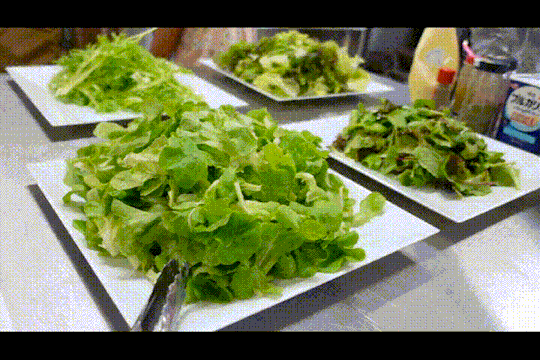
美味しくなるポイント02「ドレッシングの和え方」
ドレッシング…上からかけていませんか?「レストランではドレッシングは上からかけていないけれど、美味しいですよね?」と大澄さん。たしかに、ドレッシングが一ヵ所だけ集中してかかっているとしょっぱいですが、全体に均一に味がついている方が美味しいです。(なので、この見出しも「和える」という表現にしました)
均一に味を付けるコツは、ビニール袋に野菜とドレッシングをスプーン二杯入れて……フリフリ~!このやり方ならば、子どもでも楽しくお手伝いできそう!

そして、まんべんなくドレッシングが行き渡ることで、ドレッシングの油分が野菜をよりツヤツヤに魅せてくれます。
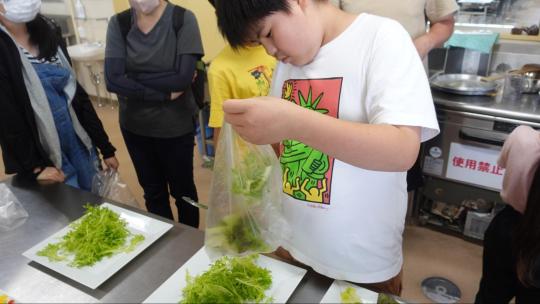
完成した、スペシャルランチはこちら!
食材は、ほぼ北海道産です!
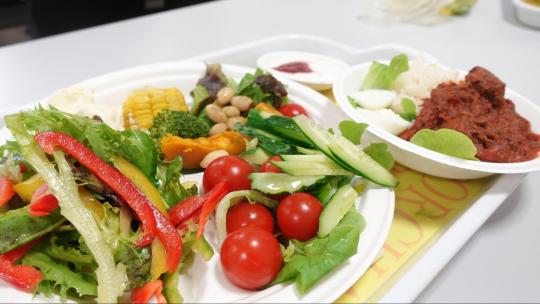
手前のミニトマトは、先ほど見学した「Jファーム」のトマト。 ピカピカで宝石みたいです!
プレートの中央にあるカボチャは、札幌市手稲山口の特産「大浜みやこかぼちゃ」、そして今が旬のトウモロコシ。
写真奥のカレーは、トマトと牛肉の夏カレー。牛肉は道内産で「キタウシリ」というホルスタイン種の肥育牛がたっぷり入っています。
そして、アグリコラの卵も「玉子サラダ」になっていました。 見てください、このクリーム色の黄身を! ”見た目ウケのために飼料に着色料を混ぜたりしない“とは言ってましたが、着色しないと黄身がこんなに色が薄いことを知りませんでした。
そして、黄身の色が薄くても、味はしっかり。それでいて全く臭みを感じない、澄んだ味でした。
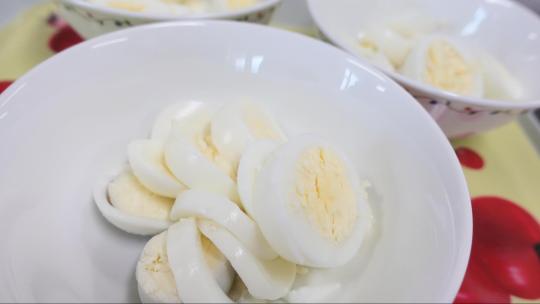
まとめ
近郊農場をめぐり、生産者さんの話を聞いて、最後は採れたて野菜や地元の食材たっぷりのランチで締める!農場見学もランチも大満足!頭も心もお腹も満たされる一日でした。
主催 農業魅力再発信プロジェクト推進協議会 運営・企画 HERB & COOKING KINA
2 notes
·
View notes
Text
Insufferable "gourmet"
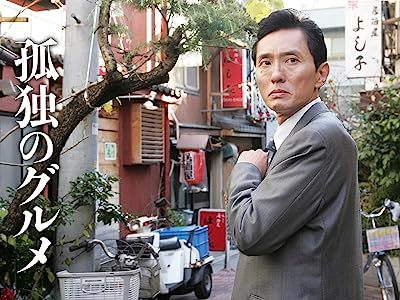
A blogger named SPYBOY spends his weekends eating delicious gourmet food such as Italian and Chinese food. He will spend 30,000 yen ($300) on one meal. He denies creative cuisine. He says it's because the recipes of top restaurants are complete and sophisticated, but creative cuisine doesn't come close.
I don't have money to spend, so I'm always creative. There is a "path" to cooking, and if you keep it under control, I think it's easy to bring out the taste of a first-class restaurant, so I often disagree with this blogger, SPYBOY.
And, as you might imagine, SPYBOY denies convenience stores. He hates convenience stores like a scorpion because they only sell foods with lots of additives. However, the process of cooking is all about adding additives to the ingredients.
Furthermore, he says that he is a sympathizer of Vietnamese people, but when I suggest that he should shop at a convenience store once in a while to support them who work at a convenience store in Japan, he refuses. Well, in other words, being a Vietnamese sympathizer is also a pose, and the rich SPYBOY wants to spend money only on gourmet food. It's a boring hobby.
鼻持ちならない「グルメ」
SPYBOYというブロガーは、週末になると、イタリアン、中華など、金に飽かせて美味しいグルメを食べまくる。彼は一回の食事で3、4万円(300ドル)は散財するだろう。彼は創作料理を否定する。一流レストランのレシピが完備され洗練されているのに、創作料理は及びもつかないからだと彼はいう。
私などは、散財する金がないので、いつでも創作料理だ。料理には「道筋」があり、それを抑えておけば、一流レストランの味をだすことなど、簡単だと私は思うので、このSPYBOYというブロガーとは、意見が対立することが多い。
そして、想像できそうなことだが、SPYBOYはコンビニエンスストアを否定する。添加物の多い食品ばかり売っているというので、コンビニエンスストアを蛇蝎のごとく嫌うのだ。でも、料理を作る過程は、すべて「食材に添加物を加える過程ではないのか?」コンビニエンスストアを否定する理由が見つからないではないか。
さらには、彼はベトナムの人たちのシンパだというが、日本でコンビニエンスストアに勤める彼らを援助するために、たまにはコンビニエンスストアで買い物したらどうか、と私が提案すると、拒否する。まあ、つまりはベトナム人シンパであるのもポーズで、金持ちのSPYBOYは、グルメにのみ、お金を使いたいのであろう。鼻持ちならない趣味だな。
#Insufferable “gourmet”#gourmet#rei morishita#SPYBOY#creative cuisine#it's easy to bring out the taste of a first-class restaurant#convenience stores#additives#sympathizer of Vietnamese people#pose#boring hobby#There is a “path” to cooking
2 notes
·
View notes